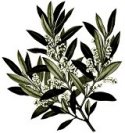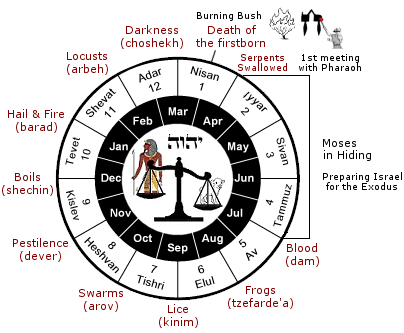|
January 2011 Updates
Gemilut Chasadim

[ The following is related to this week's Torah reading (Terumah). Please read the Torah portion to "find your place" here. ]
01.31.11 (Shevat 26, 5771) The Hebrew word "terumah" (תְּרוּמָה) means "a gift" which the Israelites were asked to give for the building of the Tabernacle (i.e., the Mishkan, or the symbolic presence of God revealed at Sinai). The gifts needed for "building a dwelling place" were to be given out of love, not from a grim sense of duty...
The Hebrew phrase gemilut chasidim (גְּמִילוּת חֲסָדִים) means "the bestowal of kindnesses," or the practice of chesed (i.e., love). Such benevolence is regarded as greater than tzedakah (doing the right thing out of a sense of duty) because love anticipates the needs of others and acts from a sense of compassion. As an old Jewish proverb states: "Tzedakah awaits the cry of distress; benevolence anticipates the cry of distress."
A maxim in the Mishnah (c. 220 AD) states that the practice of benevolence is an integral part of spiritual life:
 |
Shimon ha-Tzaddik hayah misyarei kheneset ha-gedolah. Hu omer:
al sheloshah devarim ha'olam omed: al ha-Torah
v'al ha'avodah v'al gemilut chasadim.
Simon the Righteous was from the remnant of the Great Assembly. He used to say:
'On three things the world stands: On the Torah, on service to God (avodah),
and on acts of lovingkindness (gemilut chasadim).' Avot 1:2
According to Jewish tradition, just as a chair requires at least three legs to function, so we must engage in the study of Scripture, serve the LORD "with all our hearts," and truly love another. Please notice that each of these "pillars" may be found in the (earlier) writings of the New Testament. For example, we are called to study the Scriptures (Acts 17:11, 2 Tim. 2:15); we are called to serve and love God (Matt. 4:10, 6:24, 1 Thess. 1:9, 2 Tim 1:3), and we are called to love one another (John 13:34-35, John 15:17, Rom. 12:10, 13:8, etc.). Indeed the Torah of Messiah (תּוֹרַת הַמָּשִׁיחַ) is the path of sacrificial love and gemilut chasidim (Rom. 13:8-10, Gal. 5:14, 6:2).
A midrash says that everyone has two angels. One angel collects our good deeds, while the other collects our sins. Once a man who was known for acts of benevolence stood before a judge who would decide whether he would go to heaven or go to hell. The judge offered him a unique privilege, however. He told the man he could first visit both heaven and hell and then choose between them. A chariot of fire then appeared and took the man off to a remote castle, floating upon a cloud. There he saw a great hall, filled with many tables. On each table were all sorts of delectable foods - the greatest feast imaginable. The man then heard the sound of sad chanting as many people entered the hall. The people came to the tables but could not eat, even though they were all emaciated and very hungry. On each person's left hand was tied a giant fork, and on their right was tied a giant spoon. They could not bend their elbows to bring any food to their mouths. An angel then said to the man "This is hell. Now go visit heaven."
The chariot of fire then took him to another castle floating upon a cloud. It looked just like the first. The great hall was also filled with many tables upon which was set all sorts of delectable foods. The man then heard the sound of happy chanting as many people entered the hall. The people came to the tables but they did not look emaciated. On each person's left hand was tied a giant fork, and on their right was tied a giant spoon. They could not bend their elbows to bring any food to their mouths. As the man watched, however, the people began to feed one another. Each person picked up food and carried it to his neighbor's mouth. The angel then said, "This is heaven. The people make it heaven since they have found a way to do gemilut chasidim."
The man then was brought before the judge again. "Have you decided to go to heaven or to hell?" The man answered, "I choose hell. I will teach them the secret of creating heaven. This will be my last good deed."
Practicing compassion is the underlying motivation for adherence to all the commandments, for without the inner motivation of love, there is little point to anything else the Torah might say. After all, the two great commandments of Scripture center on loving God and loving others as ourselves. The problem, however, is not understanding our obligation to love, but rather finding the power or will to truly do so.... If we have trouble keeping the first and greatest commandment, we need to begin there and seek Divine Help...
Of course we are not saved by means of "works of righteousness that we have done" (Titus 3:5), but we instead trust (exclusively) in the righteousness of God (δικαιοσύνη θεοῦ ἐν αὐτῷ) given on our behalf. "For our sake he made him to be sin who knew no sin, so that in him we might become the righteousness of God" (2 Cor. 5:21). This is an "imputed" form of righteousness that settles the question of our identity before the Father. Nonetheless those who are God's children will evidence their "new nature" in the choices of their lives. "If you know that He is righteous, you may be sure that everyone who practices righteousness (πᾶς ὁ ποιῶν τὴν δικαιοσύνην) has been born of him" (1 John 2:29). "Doing" and "being" are united in the Hebraic mindset...There is no "being" righteous apart from the "doing" acts of righteousness. As Yeshua said, "You shall know them by their fruits..."
Traditional Judaism is a form of meritocracy that is based on the efforts of the human will to obey God (i.e., by performing mitzvot). Those who follow Yeshua, however, are given the Holy Spirit to enable them to walk according to a "higher law" - called the law of the Spirit of Life - that sets them free from the law of sin and death (i.e., that principle that vainly attempts to justify the soul through its own inner merit). In both cases the end is the same (i.e., the practice of righteousness and acts of gemilut chasidim), though the motive and the means are entirely different. The Cross of Yeshua is the dividing point. The ego must die along with its agenda (John 12:24; Luke 9:23). We perform acts of righteousness and walk in love because God graciously enables us to do so as the result of our new nature in Messiah. There is an infinite difference between working from a place of God's love and acceptance and working for it...
May God grant you bittachon (complete trust) in His unfailing love as revealed in Yeshua our Messiah.... Amen.
 |
Parashat Terumah - תרומה

[ The following is related to this week's Torah reading (Terumah). Please read the Torah portion to "find your place" here. ]
01.31.11 (Shevat 26, 5771) Beginning with this week's Torah portion (i.e., Terumah) and continuing until the end of the book of Exodus, the construction of the Tabernacle (Mishkan) and its contents are described. The word terumah (תְּרוּמָה) means "contribution," "gift," or "freewill offering," and the portion begins with the LORD asking for gifts "from every man whose heart moves him" to provide the needed materials for the Mishkan Kodesh (Holy Tabernacle) -- the tent-like structure that would symbolize God's Presence among the Israelites during their sojourn to the land of Canaan. Gold, silver, brass, red and purple yarns, fine linens, oils, spices, precious stones, etc., all were needed. No gift was considered too small, and whoever felt prompted by the LORD to give did so freely, without compulsion. God's house is always built by love freely given....
Notice that the portion begins with, "Take for Me an offering" (וְיִקְחוּ־לִי) instead of "Give for Me an offering" (Exod. 25:1-2). The sages explained that when we give tzedakah (charity), it may seem like we giving something from our own substance for the sake of another, but in truth we are actually taking, since we are spiritually receiving back much more than we give (both in this life and especially in the world to come). The reward we get in return for our giving is always much greater than whatever we originally gave. Thus, text implies that giving is really a kind of "taking..." This agrees with Yeshua's words that when we give to others we actually receive from God: "Give, and it will be given to you. Good measure, pressed down, shaken together, running over, will be put into your lap. For with the measure you use it will be measured back to you" (Luke 6:38).
This line of thinking goes way back in Jewish thinking. Rabbi Asi said, "Charity equals in importance to all other mitzvot combined," and Rabbi Yehudah likewise says, "Ten hard things have been created in the world. The rock is hard, but iron shatters it. Iron is hard, but fire softens it. Fire is powerful, but water extinguishes it. Water is heavy, but clouds carry it. Clouds are thick, but wind scatters them. Wind is strong, but a body resists it. The body is strong, but fear crushes it. Fear is powerful, but wine banishes it. Wine is strong, but sleep works it off. Death is stronger than all, yet tzedakah delivers from death, as is written, "Charity delivers from death" (Prov. 10:2).
Indeed, the New Testament continues the inner meaning of the Torah's revelation that we are blessed when we give terumah to those in need. "God loves a cheerful giver." Followers of the Mashiach Yeshua are to be marked by goodness (טוֹבָה) expressed in generosity (נְדִיבוּת). The fruit of the Spirit (פְּרִי הָרוּחַ) constitutes the supernatural outgrowth of the grace and love of God in the heart of one who trusts in Yeshua the Messiah (see John 15:1-8). Those who are righteous will walk in tzedakah, resembling the character of the LORD Himself (1 John 2:29).
Note: I hope to add some additional commentary to this portion this week. Your prayers for this work are deeply appreciated, chaverim....
 |
Rosh Chodesh Adar - ראש חדש אדר
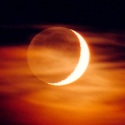
[ This coming Sabbath marks the start of the Hebrew month of Adar I and is therefore called Shabbat Rosh Chodesh. It is customary to read passages from the Scriptures that remember the significance of the new moon at this time.... ]
01.31.11 (Shevat 26, 5771) On the Biblical calendar the month of Adar (אֲדָר) is the last month of the year (counting from Nisan), however during Jewish leap years an additional month (called Adar II) is appended to the calendar. From the point of the Jewish holidays, the "last Adar" of the year is always considered "the" month of Adar, so, for example, during leap years the holiday of Purim is always observed on the 14th of Adar II. In other words, whenever the calendar shows two months of Adar (i.e., Adar I and Adar II), we will celebrate Purim during the second Adar. Nonetheless, the 14th of Adar I is commemorated as Purim Katan, the "little Purim," and is regarded as a minor holiday. Since this year (5771) is a Jewish leap year, "Little Purim" will be observed on Thursday, February 17th at sundown (i.e., the 14th of Adar I).
At any rate, the appearance of the new moon reminds us of the passing of days and provides us with an opportunity to ask the LORD to renew our strength for the month ahead. May God help you and give you His favor for the month ahead, chaverim.
Rosh Chodesh Blessing:
יְהִי רָצוֹן מִלְּפָנֵיךָ יהוה אֱלהֵינוּ וֵאלהֵי אֲבוֹתֵינוּ
שֶׁתְּחַדֵּשׁ עָלֵינוּ חדֶשׁ טוֹב בַּאֲדנֵינוּ יֵשׁוּעַ הַמָּשִׁיחַ אָמֵן
ye·hi · ra·tzon · mil·fa·ne·kha · Adonai · E·lo·hei·nu · ve·lo·hei · a·vo·tei·nu
she·te·cha·desh · a·lei·nu · cho·desh · tov · ba'a·do·nei·nu · Ye·shu·a · ha·ma·shi·ach · A·men

"May it be Your will, LORD our God and God of our fathers,
that you renew for us a good month in our Lord Yeshua the Messiah. Amen."

Download Study Card
Mishpatim "Table Talk" Guide

[ The following is related to this week's Torah reading (Mishpatim). Please read the Torah portion to "find your place" here. ]
01.28.11 (Shevat 23, 5771) This week's Table Talk guide is a little different because of the nature of the "legal material" presented in the parashah. Like other Table Talk guides, I first provide a brief synopsis of the week's reading, but for this week I added a preliminary set of questions regarding basic Jewish perspectives about the law. I then go on to list some straightforward questions along with some additional topics for discussion. I hope you find it helpful. You can download the guide here.
הִנֵּה עֵין יְהוָה אֶל־יְרֵאָיו לַמְיַחֲלִים לְחַסְדּוֹ
hin·nei ein Adonai el ye·rei·av; lam·ya·cha·lim le·cha·sdo

"Behold, the eye of the LORD is on those who fear him,
on those who hope in his steadfast love" (Psalm 33:18)

Hebrew Study Card
Shabbat Shalom to you all.... Be well, stay strong, and above all keep hope in Yeshua.
Walking in Righteousness...

[ The following is related to this week's Torah reading (Mishpatim). Please read the Torah portion to "find your place" here. ]
01.27.11 (Shevat 22, 5771) R' Eliezer said that when justice is done on earth, heaven suspends judgment and does not exact punishment; but when there is no justice, heaven sits in judgment and sends down punishment... Likewise Pirke Avot states, "The sword comes into the world because of justice delayed and justice perverted, and because of those who misinterpret the Torah" (Avot 5:8). The world is in the perilous state it is today because it categorically disregards God's command to pursue justice and truth, especially for those who are downtrodden. Because of this, "justice is far from us, and righteousness does not overtake us; we hope for light, and behold, darkness, and for brightness, but we walk in gloom" (Isa. 59:9). The day of God's reckoning draws near (Psalm 2:2-12).
צֶדֶק צֶדֶק תִּרְדּף לְמַעַן תִּחְיֶה וְיָרַשְׁתָּ אֶת־הָאָרֶץ
אֲשֶׁר־יהוה אֱלהֶיךָ נתֵן לָךְ
tze·dek tze·dek tir·dof, le·ma·an tich·yeh ve·ya·rash·ta et-ha·a·retz,
a·sher Adonai E·lo·he·kha no·ten lakh

"Justice, justice shall you pursue, that you may thrive and occupy the land
that the LORD your God is giving you." (Deut 16:20)

Hebrew Study Card
The Hebrew word tzedek means "righteousness" or "justice" and is one of the fundamental attributes of the LORD God of Israel. Almighty God is called the LORD our Righteousness (יהוה צִדְקֵנוּ), the Righteous God (אֱלהִים צַדִּיק), the Righteous Judge (שׁוֹפֵט צַדִּיק), and so on. The righteousness of God implies that we who are created in His image have a corresponding duty to exercise righteousness in our daily lives. An act of tzedakah (charity) is therefore regarded as an moral obligation rather than as gemilut chasadim (i.e., act of benevolence). The prophet Isaiah wrote: "The work of tzedakah shall be peace (מַעֲשֵׂה הַצְּדָקָה שָׁלוֹם)" and added that "the service of righteousness (וַעֲבדַת הַצְּדָקָה) shall be quietness and security forever (Isa. 32:17).
Practicing righteousness is NOT optional for the follower of Yeshua, the King of Righteousness (מֶלֶךְ הַצְּדָקָה). Tzedek, tzedek tirdof (צֶדֶק צֶדֶק תִּרְדּף), "justice, justice, you shall pursue," is a message for Christians. "If you know that He is righteous, you may be sure that everyone who practices righteousness (πᾶς ὁ ποιῶν τὴν δικαιοσύνην) has been born of him" (1 John 2:29). "Doing" and "being" are united in the Hebraic mindset...There is no "being" righteous apart from the fruits of righteousness. As Yeshua said, "You shall know them by their fruits..."
You cannot have the Cross without the Torah,
and you cannot have the Torah without the Cross... God is One.
Note: While we are not justified by "works of righteousness" (Titus 3:5-6), we nonetheless will evidence righteousness as a result of the miracle of regeneration. Indeed, faith in the efficacy of the cross of Yeshua (i.e., God's salvation) implies acknowledging the righteousness of God... In other words, you cannot have the cross without the Torah, and you cannot have the Torah without the cross... Faith in God's righteousness transcends the weakness of the law (caused by human frailty, not by the character of the law itself) by imparting a new principle (or law) called the law of the Spirit of Life in Yeshua the Messiah (תּוֹרַת רוּחַ הַחַיִּים בְּיֵשׁוּעַ הַמָּשִׁיחַ): "For the law of the Spirit of life in the Messiah Yeshua has set you free from the law of sin and death" (Rom. 8:2). The "law of sin and death" (תּוֹרַת הַחֵטְא וְהַמָּוֶת) is the principle of the "flesh" that we remain subject to until we come to completely trust in the righteousness that only God gives us through Yeshua our Savior.... Then the miracle occurs.
"Then he showed me Joshua the high priest standing before the Angel of the LORD (מַלְאַךְ יְהוָה), and Satan standing at his right hand to accuse him. And the LORD said to Satan, "The LORD rebuke you, O Satan! The LORD who has chosen Jerusalem rebuke you! Is not this a brand plucked from the fire?"
Now Joshua was standing before the Angel, clothed with filthy garments. And the Angel said to those who were standing before him, "Remove the filthy garments from him." And to him he said, "Behold, I have taken your iniquity away from you, and I will clothe you with pure vestments." And I said, "Let them put a clean turban on his head." So they put a clean turban on his head and clothed him with garments.
And the Angel of the LORD (מַלְאַךְ יְהוָה) was standing by. And the Angel of the LORD solemnly assured Joshua, "Thus says the LORD of hosts (יְהוָה צְבָאוֹת): If you will walk in my ways and keep my charge, then you shall rule my house and have charge of my courts, and I will give you the right of access among those who are standing here. Hear now, O Joshua the high priest, you and your friends who sit before you, for they are men who are a sign: behold, I will bring my servant the Branch (צֶמַח). For behold, on the stone (הָאֶבֶן) that I have set before Joshua, on a single stone with seven eyes, I will engrave its inscription, declares the LORD of hosts, and I will remove the iniquity of this land in a single day." (Zech 3:1-9)
Notice the order of this amazing vision. First Joshua (Yehoshua ben Yehotzadak) was cleansed from his iniquity and clothed in God's righteousness, and then he was commanded to walk in the LORD's ways and to keep God's charge. This undoubtedly prefigured the grace of Tzemach Tzaddik (צֶמַח צַדִּיק), the Righteous Branch to come, who would likewise take away our sin and clothe us with God's righteousness. We are given the Holy Spirit to enable us to respond to God's love and to obey Him as dear children (Eph. 5:1-2). The LORD is the same yesterday, today, and forever, and He calls each of us to walk in holiness before Him (Lev. 20:7; 1 Pet. 1:15-16).
Mishpatim and Tradition...

[ This week's Torah portion (Mishpatim) includes a lot of "legal" material (i.e., "civil laws," "judgments," etc.). This article briefly looks at the idea of law as it relates to traditional Jewish thought. Please review the Torah portion to "find your place" here. ]
01.26.11 (Shevat 21, 5771) Last week's Torah portion (Yitro) explained that exactly seven weeks after the Exodus from Egypt, Moses gathered the Israelites at the foot of Mount Sinai to enter into covenant with the LORD. In a dramatic display of thunder, lightning, billowing smoke and fire, the LORD then descended upon the mountain and recited the Ten Commandments to the people. Upon hearing the law's moral requirements, however, the people shrank back in fear and begged Moses to be their mediator before God. The people then stood far off while Moses alone drew near to the thick darkness to receive the details of the Torah from the LORD.
This week's Torah portion begins with Moses in the midst of the "thick darkness" receiving additional rules (i.e., mishpatim, "legal judgments") regarding civil life for the newly redeemed people. The sages count 53 distinct commandments listed in this portion of the Torah, making it one of the most "legalistic" sections of the Bible. Civil laws, liability laws, criminal laws, agricultural laws, financial laws, family purity laws, Sabbath laws, and holiday laws are all given in this portion.
In Jewish thought, the word "Torah" (תּוֹרָה) is a general concept that implies a wide range of related ideas and concepts that focus on discerning God's will. A primary distinction is between the written Torah, on the one hand, and the oral Torah on the other. The written Torah, called shebichtav (שֶׁבִּכְתָב, "that which is written"), refers to the text that has been meticulously transmitted since the time of Moses in the form of a Sefer Torah (i.e., a kosher Torah scroll). The oral Torah, on the other hand, is called shebal peh (שֶׁבְּעַל פֶּה, "that which is oral"), and refers to legal and interpretative traditions handed down by word of mouth until these were codified in the Mishnah and Gemara (i.e., the Talmud). The Oral tradition further includes the Midrash (traditional exegesis), the Responsa (questions and answers given by "poskim," or legal scholars), the Shulchan Aruch (16th century codification of Jewish case law), and various other commentaries handed down over the centuries. Some people further claim that "Kabbalah" is also contained within oral tradition, though strictly speaking it is not regarded as part of the Oral Torah as understood in Jewish tradition.
Jewish thought maintains that the written Torah and the oral Torah are complementary, since Moses himself established the role of judges and law courts in the written Torah (Exod. 18:13-26; Num. 11:24-29; Deut. 16:18-20; 17:8-12), and ultimately the oral Torah derives its justification and substance from the written revelation. Indeed it is somewhat artificial to distinguish between the two in practice, since the written Torah was preserved through tradition (i.e., the scribal transmission, the books to be included in the canon, etc.), just as the oral Torah was validated by the written words of the Torah scroll itself. Moreover, within both of these "Torahs" we can make further distinctions. For example, in the written Torah there is both narrative (alilah) and Gods' explicit commandments (mitzvot), which roughly corresponds to the distinction between "aggadic" (homiletical) and "halakhic" (legal) literature found in the oral Torah. In addition, just as the 613 mitzvot of the written Torah can be subdivided into the categories of mishpatim (laws), chukkot (decrees), and eidot (testimonials), so the Jewish legal tradition discusses the corresponding ideas of takkanot (case laws), gezerot (rabbinical decrees), and minhagim (customs). In short, there is a sort of circular reasoning involved in the traditional Jewish idea of Torah: The written Torah was passed down (validated) by means of the oral Torah; but the oral Torah derives its authority from the written Torah:
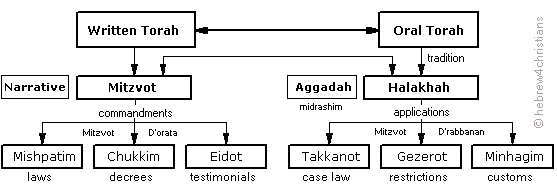 |
It is important to keep these distinctions in mind whenever we discuss the meaning of the word "Torah." Many Christians tend to oversimplify the issue by regarding the Torah as "the law" or the first five books of Moses. For most Jews, however, the word "Torah" encompasses the collective (and ongoing) discussion about the meaning and significance of the words of Moses (and of the prophets) that has been taking place for thousands of years. Understood in this sense, Torah represents the collective "memory" of the Jewish people as they have reasoned through questions about law, custom and tradition over the centuries.
(Of course the Christian faith has a somewhat similar relationship between the authoritative texts of the Bible, on the one hand, and the influence of religious tradition on the other. The transmission of the Greek New Testament, the decision to include certain books into the canon (and to exclude others), the basic theological interpretations that defined the idea of the "church," the role of the sacraments, and so on, are just as much a part of Christian history as they are a part of Jewish history.)
To illustrate the process of understanding a particular mishpat, or "rule" given in the written Torah, we can take as an example the commandment to "distance yourself from a false word" (i.e., מִדְּבַר־שֶׁקֶר תִּרְחָק) found in this week's Torah portion (Exod. 23:7). First note that the Hebrew text itself does not define midbar-sheker (a "false word," or a "false thing"), nor does it define the verb used in this phrase (i.e., rachak: רָחַק), and therefore we are forced to look to tradition (i.e., lexicons, translations, commentaries, etc.) to help determine the meaning of this commandment. Most reputable lexicons identify the root of the verb to mean "being far" or "distant" from something, and then go on to provide basic usage examples found in the Scriptures. Apart from this sort of linguistic information, however, we must look to the Jewish tradition to better understand the meaning of this text. When we do so, we discover that the sages noted that the verb rachak was not used with other commandments in the Torah, and therefore they were careful to study the context of the commandment as it appears in the surrounding flow of the text itself (i.e., the litany of rules to be used when deciding cases of civil law and matters of jurisprudence). The sages then compared this with related concepts revealed in the Torah, such as the requirement for judges to be impeccably truthful and fair in their decisions, to refrain from accepting bribes, to fear God and not man, and so on (Exod. 18:21; Deut. 1:16, etc.). After going through this sort of process, the sages began to dialog about the intent of the commandment as a call to preserve the integrity of the entire judicial process itself. The rule that a judge must be "far removed from a false matter" is therefore understood as the prohibition from taking a bribe in matters of civil law.
The sages further compared the commandment to "distance yourself from a false matter" with the more general commandment found in the Book of Leviticus: "You shall not deal falsely with one another" (i.e., לא־תְכַחֲשׁוּ, in Lev. 19:11). According to most of the traditional commentators, truth-telling is regarded as a moral imperative of Torah - whether in matters of civil law or in interpersonal relationships. Indeed, throughout the ethical teaching of the Scriptures, the tzaddik, the righteous man, is always described as yashar - a person full of integrity and moral righteousness. We have a moral obligation, in other words, to speak truthfully, and an entire area of mussar (traditional Jewish moral education) concerns the topics of lashon hara (evil speech), dibbur emet (speaking the truth), and so on.
Nonetheless, the sages note that things are not always "black and white," and they therefore wrestled with the question of whether it was ever permissible to set aside the obligation to speak the truth in certain mitigating circumstances. For example, in Jewish tradition, Aaron is known as a man "who loved peace, pursued peace, and created peace between man and his friend" (Sanhedrin 6b). The sages note that whenever a dispute developed between two Israelites, Aaron would go to each party and say that the other person deeply regretted the quarrel. Aaron's "fabrications" were intended to teach the greater truth that love and peace were more important than the facts of a given case. Likewise the Talmud insists that it is appropriate to sing "How beautiful and charming is the bride" at a wedding, even if it is clear that she is not. The House of Shammai had argued that people should refrain from doing so, based on the Torah's commandment to "distance yourself from a false matter," whereas the House of Hillel argued that the obligation to avoid embarrassing the bride (and groom) takes precedence over the obligation to demand that judgments be factually correct. Sometimes, for the sake of peace, the truth may be "overlooked" for the sake of love (1 Pet. 4:8; Prov. 17:9). In this connection we note how Joseph intended to spare Mary shame and disgrace after it became known that she was pregnant with Yeshua (Matt. 1:19).
The sages further argue that this approach may be seen in the Torah itself. For instance, when the three angels appeared before Abraham and Sarah to announce the birth of Isaac, Sarah laughed and said within herself, "After I am worn out and my husband is so old, shall I enjoy this pleasure?" The LORD, however, did not repeat Sarah's words but abbreviated them as: "Shall I indeed bear a child, now that I am old?" (Gen. 18:12-13). According to the traditional commentaries, the LORD "overlooked" Sarah's reference to Abraham's old age in order to keep the peace between them....
All of this discussion is meant to lead to practical application and to discern principles of conduct by which we should strive to order our decisions. As I've mentioned elsewhere, if deception is sometimes "allowed" for the sake of peace and love, the converse also appears to be true. Truth can be used as a weapon in the service of the kingdom of Hell... In other words, sometimes true words and actions performed in an unloving or spiteful manner are morally blameworthy. Dietrich Bonhoeffer (1906–1945) tells the story about how a teacher once humiliated one of her students by standing him up in front of the class to ask whether his father -- notoriously known as the town drunk -- had been out drinking the night before. The little boy knew the accusation was factually true but bravely announced "No." When the teacher mockingly asked him again, pressing him for "the truth," the boy was adamant: "NO!" Bonhoeffer's comment was that this little boy spoke more truth by his lie than if he had merely reported the "facts" to the class -- and thereby betrayed the dignity of his father... The truth is not some objective state of affairs that can be reported dispassionately. Without love as its context, such "truth" becomes a lie.
Some people believe that truth should never be compromised - even at the expense of the feelings and needs of others - while others insist that it is wise to sometimes seek compromise, especially regarding matters of personal "rights." Yeshua warned us, "Come to terms quickly with your accuser while you are going with him to court, lest your accuser hand you over to the judge, and the judge to the guard, and you be put in prison. Truly, I say to you, you will never get out until you have paid the last penny" (Matt. 5:25-26). The cost of pursuing "truth" at the expense of mercy is costly indeed, and often the demand for justice is a proverbial two-edged sword. The true neighbor is the one who shows compassion and mercy (Luke 10:29-37). As James put it: "For judgment is without mercy to one who has shown no mercy. Mercy triumphs over judgment" (James 2:13).
There is a mandate to speak out for justice, and to keep silent in the face of oppression may amount to cowardly assent for its occurrence. As it is written: "tzedek, tzedek tirdof" (צֶדֶק צֶדֶק תִּרְדּף): "Justice, Justice you shall pursue" (Deut. 16:20). Indeed it can be unloving not to warn others that their lives are under divine examination and that one day they will face personal judgment for all they have done in this world... We are all accountable before God for the moral decisions we make in our lives, just as we are all accountable for every careless word we utter (Matt. 12:26-27). However, the impulse to demand justice from others must be carefully weighed against the greater need to use a "good eye" and to extend the benefit of the doubt... If we seek to correct others, we must always remember that we have blind spots of our own (Matt. 7:3-5).
Of course balance is called for in all of this, since even God Himself mediates the attributes of His perfect justice with the attributes of His perfect mercy:
צֶדֶק וּמִשְׁפָּט מְכוֹן כִּסְאֶךָ
חֶסֶד וֶאֱמֶת יְקַדְּמוּ פָנֶיךָ
tze·dek u·mish·pat me·khon kis·e·kha,
che·sed ve·e·met ye·kad·de·mu fa·ne·kha

"Righteousness and justice are the foundation of your throne;
steadfast love and faithfulness go before you" (Psalm 89:14)
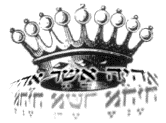
Download Study Card
The message of the cross is that "steadfast love and truth have met; righteousness and peace have kissed each other" (Psalm 85:10). Because of Yeshua, God is vindicated as entirely just - and the Justifier of those who trust in His redemptive love (Rom. 3:24-26). The author of the Book of Hebrews states that "in these last days God has spoken to us by his Son, whom he appointed the heir of all things, through whom also he created the world" (Heb 1:2). The Greek construction for the phrase translated, "by his son" is ἐλάλησεν ἡμῖν ἐν υἱῷ, which literally means "he spoke to us in son" -- that is, in the language or voice of the Son of God Himself... God now speaks in the language "of Son," which is the language of mercy, grace, and forgiveness. May God help us all to speak this language to one another as we walk in the righteousness His love demands....
Personal Update: Please keep me in your prayers, chaverim. I am running a low-grade fever and feel very weak today. I am also experiencing a good deal of pain in my arms and shoulders. Thank you...
 |
Asking for Prayer...
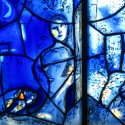
01.25.11 (Shevat 20, 5771) Shalom chaverim. I am exhausted from the last few weeks of writing, etc., and sincerely ask you for your prayers. Often what wears me out is not the so much the study and writing about the Scriptures (which of course is a great joy), but the maintenance of the site and tedious technical problems I face on a daily basis (I will spare you the details). In addition, it is difficult for me to find time to do this work except throughout the night, when the children are asleep -- but this means that go without much sleep myself.... I sometimes deal with a heavy spiritual oppression that attends my chronic pain issues. Please offer up a prayer for my strength to continue this work. Thank you so much for your help.
הָרפֵא לִשְׁבוּרֵי לֵב וּמְחַבֵּשׁ לְעַצְּבוֹתָם
ha·ro·fei lish·vu·rei lev, u'me·cha·besh le·atz·tze·vo·tam

"He heals the brokenhearted
and binds up their wounds" (Psalm 147:3)
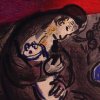
Download Study Card
International Holocaust Remembrance Day

01.24.11 (Shevat 19, 5771) Thursday January 27th marks the anniversary of the liberation of Auschwitz-Birkenau, the largest of the Nazi death camps. In October 2005, the United Nations General Assembly designated this day as "International Holocaust Remembrance Day" to commemorate and honor the victims of the Nazi era. Note that the UN-sponsored date is NOT the same thing as the Jewish observance of Yom HaShoah, which occurs in the spring (Nisan 27).
The systematic genocide of the Jewish people is one of the most heinous crimes in the history of humanity. Reflecting on the atrocities should lead each of us to be vigilant to protect the individual liberties of all people at the hands of the State. Any political ideology or religious creed that elevates the interest of the "collective" over the sanctity of the individual is therefore inherently suspect....
For more information about IHRD, see this page.

Parashat Mishpatim - משפטים

[ The following is related to this week's Torah reading (Mishpatim). Please read the Torah portion to "find your place" here. ]
01.23.11 (Shevat 18, 5771) Our Torah portion for this week concerns various social and civil laws of ancient Israel called "mishpatim." The word mishpatim (מִשְׁפָּטִים) means "rules" or "judgments," and is derived from a root meaning "to judge" (i.e., shafat, שָׁפַט). The LORD is called the Ha-Shofet kol ha'aretz (הֲשׁפֵט כָּל־הָאָרֶץ) -- the "Judge of all the earth" who loves justice (Gen. 18:25, 37:28, Psalm 50:6, 94:2). We are commanded to pursue righteousness through the exercise of right judgment: tzedek, tzedek tirdof (צֶדֶק צֶדֶק תִּרְדּף): "Justice, Justice you shall purse" (Deut. 16:20). God expects us to make wise decisions based on moral truth (Prov. 31:9, John 7:24).
The commentator Rashi noted that this portion of Torah continues the earlier account of the Sinai revelation. The parashah begins וְאֵלֶּה הַמִּשְׁפָּטִים אֲשֶׁר תָּשִׂים לִפְנֵיהֶם׃ / v'eleh hamishpatim asher tasim lifneihem: "And these are the rules (mishpatim) that you shall set before them" (Exod. 21:1). Rashi notes that the term v'eleh (וְאֵלֶּה, "and these are...") is always used to add to the preceding text. In other words, the connecting Vav (ו) links what is being said with what went before. The mishpatim, then, were written to elaborate the teaching (תּוֹרָה) given in the Ten Commandments.
Parashat Mishpatim is sometimes called Sefer HaBrit (סֵפֶר הַבְּרִית), "the Book of the Covenant," because it lists various social laws that Moses wrote down (Exod. 24:7). It is therefore a "subset" of the Torah -- a separate scroll -- that elaborated on the terms of the covenant initially made at Mount Sinai (i.e., the giving of the Ten Commandments). After it was written, Moses built an altar at the foot of Mount Sinai with twelve pillars (one for each tribe of Israel), and ordered sacrifices to the LORD to be made. He then took the sacrificial blood from the offerings, threw half upon the altar and read the covenant to the people. The people ratified the covenant with the words: כּל אֲשֶׁר־דִּבֶּר יהוה נַעֲשֶׂה וְנִשְׁמָע / kol asher diber Adonai na'aseh v'nishma ("all that the LORD says we will do and obey" (Exod. 24:7). Upon hearing their ratification, Moses took the other half of the sacrificial blood and threw it on the people saying, "Behold the blood of the covenant (דַּם־הַבְּרִית) that the LORD has made with you in accordance with all these words" (Exod. 24:8).
Note: For more on this subject, see the article, "The Law of Love" based on this week's Torah portion.
 |
New Yitro "Table Talk"
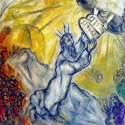
The following is related to this week's Torah reading (Yitro). Please read the Torah portion to "find your place" here.
01.21.11 (Shevat 16, 5771) Though I focused a lot of attention on the Tu B'Shevat holiday this week, I worked hard to create a new "Table Talk" for Yitro just in time for the Sabbath. I hope you find it helpful, chaverim. You can download the page here.
I would like to express my heartfelt thanks to those of you who have stood by this ministry over the years... Hebrew4Christians exists because of the faithful support of a few dear friends, and I am deeply grateful to the LORD God of Israel for each one of you. Your tzedakah and prayers keep this ministry alive and available for many others. Thank you for believing in the vision and mission of this "lonely" ministry. We wish you true health, joy, and inner peace from our LORD - despite the tribulations that arise in this fleeting world.
Sign of the Almond Tree

The following is related to the holiday of Tu B'Shevat which occurs today. Chag Same'ach chaverim. Yeshua is our Tree of Life...
01.20.11 (Shevat 15, 5771) The almond tree has special significance for Tu B'Shevat. The word for "almond" is shakeid (שָׁקֵד), which comes from a root that means to "watch" or "wake" (i.e., shakad: שָׁקַד). The almond tree is the among the first trees to "awaken" from its winter sleep... We therefore eat almonds (שְׁקֵדִים) on Tu B'Shevat to celebrate the return of spring. In the Scriptures there is a play on words regarding the use of "almond" and God's "watchfulness" (i.e., faithfulness): "And the word of the LORD came to me, saying, 'Jeremiah, what do you see?' And I said, 'I see an almond branch (מַקֵּל שָׁקֵד אֲנִי ראֶה).' Then the LORD said to me, 'You have seen well, for I am watching (כִּי־שׁקֵד אֲנִי) over my word to perform it'" (Jer. 1:11-12).
The blooming branch of an almond tree is breathtakingly beautiful - so much so that the LORD decorated the Menorah (מְנוֹרָה) with oil cups (i.e., gevi'im: גְבִעִים) in the shape of almond blossoms (Exod. 25:33-34; 37:19-20). Indeed, the Menorah itself is a symbol of the "Tree of Life" (עֵץ־חַיִּים) and therefore it is fitting to consider it during Tu B'Shevat as well. For more information about this, click the image below:
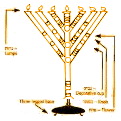
Finally, some have said that Aaron's rod (מַטֵּה־אַהֲרן) - the staff he used to perform signs and wonders during the Exodus - was made from a branch of an almond tree.... Recall that during the incident of Korach's rebellion, Aaron's rod budded, flowered and produced almonds overnight (Num. 17), which was symbolic of the power of the "resurrected priest of God" that was coming...
 |
Just as God exclusively chose Aaron to minister before Him, so Yeshua was the exclusively chosen to be the greater High Priest of the New Covenant. Regarding His priesthood "after the order of Malki-Tzedek," the author of Book of Hebrews wrote: "No one takes this honor for himself, but only when called by God, just as Aaron was" (Heb. 5:4). And just as Aaron's lifeless rod miraculously brought forth life, Yeshua's cross -- likewise made of wood -- also "budded and produced blossoms" after His resurrection from the dead. Yeshua went into the sanctuary made without hands and there offered his blood to procure for us an everlasting atonement. His sacrifice as our High Priest gives us life from the dead! Under the terms of the Sinai covenant, "Aaron's rod" was a picture of God's authority and judgment, just the Messiah's cross and resurrection vindicates God's exclusive choice of Yeshua as our Mediator before God. Those who reject His choice will ultimately share the same fate as those who partook of Korach's rebellion (Jude 1:11).
Yeshua (alone) is Adonai Tzidkenu (יְהוָה צִדְקֵנוּ), "the LORD our Righteousness" and Tzemach Tzaddik (צֶמַח צַדִּיק), God's "Righteous Branch." Praise His Name forever.
 |
Our Tu B'Shevat Seder...
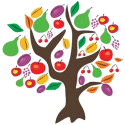
01.19.11 (Shevat 14, 5771) Chag Same'ach, Yom Tov, and love to you.... Tonight we had a small "Tu B'Shevat Seder" at our home. Olga put together a couple of plates with different kinds of fruits and nuts that we ate after dinner. With two young boys in the house, we have to keep these things simple, of course, but the kids loved watching the white grape juice change color with each successive cup. As we tasted the juice and sampled the various fruits and nuts, we recited the Hebrew blessings and talked a little about trees, plants, and how much God loves the world he created. We discussed the need to be stewards of God's creation and thought of ways we could make our world a better place.
(left to right): 1) Two types of juice for the Seder; 2) Olga lights Yom Tov candles;
3) One of the Seder plates (kiwi & grains); 4) Josiah holds up olives; 5) Judah enjoys the food!
The Scriptures state twice: שׁרֶשׁ לְמָטָּה וְעָשָׂה פְרִי לְמָעְלָה / "Take root downward and bear fruit upward" (2 Ki. 19:30; Isa. 37:21). As Yeshua said, "unless a grain of wheat falls to the ground and dies, it abides alone; but if it dies, it produces a big harvest (John 12:24). We pray we might surrender ourselves to the Lord fully, being immersed in His passion, "bearing fruit in every good work (ἐν παντὶ ἔργῳ ἀγαθῷ καρποφοροῦντες) and growing in da'at HaShem (דַעַת אֱלהִים) - the knowledge of God" (Col. 1:10). "May it be Your will, LORD our God and God of our fathers, that you renew for us a good and fruitful year in our Lord Yeshua the Messiah." Amen.
Kibitz: I've been very busy adding new content to the site the last few days. I rewrote the Tu B'Shevat pages and added some new Hebrew blessings. I created several new PDF file downloads and updated various sections of the site, including the Glossary pages. I also rewrote a bit of the parashah summary for Yitro earlier in the week.... Other than that, we've had some problems with water leaking into our house from "ice dams" on the gutters, so we spent quite a bit of time attempting to get rid of them the last couple days.
I still hope to add some content for this week's Torah portion before Shabbat arrives this week, though there just never seems to be enough time... Minimally I hope to get the "Shabbat Table Talk" for Yitro done sometime tomorrow. Please keep us in your prayers, chaverim. It is often difficult for me to do my writing except late into the night. Thank you.
 |
Tu B'Shevat - טו בשבט
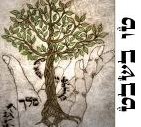
The holiday of Tu B'Shevat begins Wednesday, January 19th at sundown. Here are some thoughts and reflections about this holiday...
01.18.11 (Shevat 13, 5771) The 15th day of the Hebrew month of Shevat (i.e., Tu B'Shevat) is traditionally regarded as the time when spring begins in Israel. The rainy and cold season ends when the blossoms of almond trees first begin to appear. Indeed some scholars have said that originally Tu B'Shevat was a "folk festival" to welcome the re-emergence of spring. During the time of the Temple, Tu B'Shevat was selected as the date when Temple taxes were assessed from Jewish farmers (i.e., ma'aser). The sages reasoned that by this time the trees had begun to soak up the winter rains, causing their sap to rise, and therefore Tu B'Shevat marked the start of their growing season. In this way Tu B'Shevat became known as "Rosh Hashanah Le'ilanot," the New Year for Trees.
After the Second Temple was destroyed, the sages of the Diaspora continued to celebrate Tu B'Shevat by eating various fruits and nuts that were grown in the Promised Land. In synagogue services it became customary to partake of the seven types of grains and fruits listed in the Torah (i.e., wheat, barley, grapes, figs, pomegranates, olives, and dates) while reciting the prescribed Hebrew blessings. Almonds were eaten to recall the bloom of the almond tree. Carob also became associated with Tu B'Shevat because it was commonly eaten while traveling to Jerusalem during the days of the Temple (carob is an ideal traveling food since it does not spoil). In the sixteenth century, however, the mystics of Safed "reinvented" Tu B'Shevat to represent a time to "repair" the original sin of eating from the Tree of the Knowledge of Good and Evil in the Garden of Eden. These mystics developed an esoteric "seder" that focused on the "Tree of Life," which they understood to mean the spiritual powers that impart divine energy to the physical world (called sefirot, or divine attributes). Reciting blessings over various kinds of fruits and eating them was thought to release "divine sparks" hidden within the seeds, thus restoring the balance of the soul. Today this mystical approach is very popular in mainstream in Judaism (for more on this subject, see the Kabbalah pages).
In 1948 the Zionist dream of an independent State of Israel miraculously came to pass, and one of the first things the settlers did when they came back to their land was to plant trees and develop moshavim (collective farms). Reforesting the land by planting trees during Tu B'Shevat eventually became national custom. Today Israeli schoolchildren plant trees in special ceremonies (neti'at Etzim), and people living in the Diaspora often donate money to plant trees in Israel through the services of the Jewish National Fund. Tu B'Shevat therefore resembles an "Israeli Arbor Day" when trees are planted and the rebirth of the Jewish homeland is celebrated. It is customary to eat "first fruits" from the Land of Israel on this date, to recite various Hebrew blessings, and to discuss Jewish values such as tikkun olam ("repairing the world"), tza'ar ba'alei chayim (alleviating "the suffering of living creatures"), ahavat Yisrael ("love of Israel"), bal taschit ("do not destroy"), and so on.

Though Tu B'Shevat is not explicitly mentioned in the Torah as a holiday, the Scriptures clearly teach that God is the Creator of all life - including vegetative life (Gen. 1:11-13). God created the "seed bearing plants and fruit trees of every kind... and God saw that it was good." And God said [to Adam], "Behold, I have given you every plant yielding seed that is on the face of all the earth, and every tree with seed in its fruit. You shall have them for food" (Gen. 1:29). The warning to care for creation is found in various midrashim:
The Holy One led Adam through the Garden of Eden and said, "I created all my beautiful and glorious works for your sake. Take heed not to corrupt and destroy My world. For if you destroy it, there is no one to make it right after you." (Ecclesiastes Rabbah 7:13)
The Scriptures explicitly state various laws regarding the use of trees. In other words, there is a "Torah of Trees." For example, "When you enter the land and plant any tree for food, you shall regard its fruit as "uncircumcised" (i.e., orlah: עָרְלָה) for three years; in the fourth year all its fruit shall be holy, an offering of praise to the LORD; only in the fifth year may you use its fruit, to increase its yield for you: I am the LORD your God" (Lev. 19:23-25; 26:3-4). The Torah also clearly forbids the destruction of fruit trees during times of warfare: "When you besiege a city for a long time, making war against it in order to take it, you shall not destroy its trees by wielding an axe against them. You may eat from them, but you shall not cut them down. Are the trees in the field human, that they should be besieged by you?" (Deut. 20:19-20). Clearly God cares for trees. The psalmist describes the trees of the forest as singing for joy (Psalm 96:12), just as the prophet Isaiah foretold the day when the trees of the field shall "clap their hands" in praise to the LORD God of Israel (Isa. 55:12).
It was an old Jewish custom to plant a cedar tree when a boy was born and a pine tree when a girl was born. When two people were married, branches from these trees were used to make poles for their wedding canopy.... (The custom of planting of a "marriage tree" at the birth of a child is called neti'ah shel simchah, "a joyous planting.") On a spiritual level, this pictures being "grafted in" and made part of the marriage canopy of Yeshua, etc.
Torah alludes that human life is like "the tree of the field," i.e., כִּי הָאָדָם עֵץ הַשָּׂדֶה, Deut. 20:19), and many people therefore observe Tu B'Shevat as time to assess man's place within creation as well. Since God created the world for a habitation (Isa. 45:18), some have pictured the world itself as a "great tree" with human beings as its fruit. Yeshua often used such agricultural images in his parables. For example, he explained that people are known by the "fruits" of their lives (Matt. 7:16-20). He likened the spread of his message in terms of "sowing and reaping" (Matt. 13:3-23) and compared the Kingdom of Heaven to the secret working of a mustard seed (Matt. 13:31-32). Yeshua regarded the world as a "field" for planting with different "types of soil" (Matt. 13:38-43), and warned of the "great harvest" of souls at the end of the age (Luke 10:2; Matt. 13:30). He pointed to signs from a fig tree to indicate the nearness of the prophesied End of Days (Matt. 24:32-33). Yeshua also used the metaphor of a "vine and its branches" to explain how his followers are to be connected to Him (John 15:1-6).
During the night of Tu B'Shevat, Orthodox Jews read Pri Etz Hadar (literally "Fruit of Goodly Trees"), a booklet that contains selections from Torah, Mishnah, Gemarah, and Zohar regarding trees, fruit, fruitfulness, and so on. King Solomon declared: "The fruit of the righteous is a tree of life, and whoever captures souls is wise" (Prov. 11:30). The one who delights in the Torah (תּוֹרָה) and meditates upon it daily is likened to a tree planted by streams of water that yields fruit in its season. All that he does shall prosper (Psalm 1:1-3). The wisdom of Torah (chochmat haTorah) is metaphorically called etz chaim, a "Tree of Life." As the Torah service ends at the synagogue, it is customary to sing, "It is a tree of life to those who take hold of it, and whoever grasps it close will be made happy" (Prov. 3:18). Just as the root system of a tree is a source of sustenance for its fruit, so the Torah is the root source of wisdom for the Jew.
עֵץ־חַיִּים הִיא לַמַּחֲזִיקִים בָּהּ
וְתמְכֶיהָ מְאֻשָּׁר
etz cha·yim hi la·ma·cha·zi·kim bah, ve·tom·khe·ha me·u·shar

"It is a tree of life to those who take hold of it,
whoever grasps it close will be made happy." (Prov. 3:18)
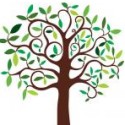
Download Study Card
The Bible begins and ends with the Tree of Life (עֵץ חַיִּים) -- first in the orchard of Eden, and then in the midst of the paradise of heaven. "The Tree of Life (etz ha-chayim) was in the midst of the garden.." (Gen. 2:9). "Then the angel showed me the river of the water of life, bright as crystal, flowing from the throne of God and of the Lamb through the middle of the street of the city; also, on either side of the river, the Tree of Life (etz ha-chayim) with its twelve kinds of fruit, yielding its fruit each month...." (Rev. 22:1-2).
Notice that the "twelve fruits" (καρποὺς δώδεκα) from the Tree of Life are directly linked to the "twelve months" of the Jewish year (κατὰ μῆνα ἕκαστον ἀποδιδοῦν τὸν καρπὸν αὐτοῦ: "each month rendering its fruit"). Twelve months; twelve fruits.... The sequence of the holidays (moedim) were always intended to teach us great revelation about God. That is why God created the Sun and the Moon for signs and for "appointed times" (Gen. 1:14). As it is also written: "He made the moon to mark the appointed times (לְמוֹעֲדִים); the sun knows its time for setting" (Psalm 104:19). Note further that the Majority Text of Revelation 22:14 reads: "Blessed are those who do His commandments (Μακάριοι οἱ ποιοῦντες τὰς ἐντολὰς αὐτοῦ) so that they may have access the Tree of Life..." Faith and obedience are two sides of the same coin.
The great command is to "Choose life!" in everything we do. If we live in faith, resurrection life will triumph in us through the Messiah. We will become agents of hope and healing to a dark and lost world... And when our redemption is finally complete, even the trees of the field will clap their hands in joy! May that day be soon, chaverim....
Tu B'Shevat Blessing:
יְהִי רָצוֹן מִלְּפָנֶיךָ יהוה אֱלהֵינוּ וֵאלהֵי אֲבוֹתֵינוּ
שֶׁתְּחַדֵּשׁ עָלֵינוּ טוֹב וּפוֹרֶה שָּׁנָה
בַּאֲדנֵינוּ יֵשׁוּעַ הַמָּשִׁיחַ, אָמֵן
ye·hi ra·tzon mil·fa·ne·kha Adonai E·lo·hey·nu ve·lo·hey a·vo·tey·nu
she·te·cha·desh a·ley·nu tov u·fo·reh sha·nah,
ba'a·do·ney·nu Ye·shu·ah ha·ma·shi·ach, a·men

"May it be Your will, LORD our God and God of our fathers,
that you renew for us a good and fruitful year
in our Lord Yeshua the Messiah. Amen."

Download Study Card
Note: If you would like to celebrate Tu B'Shevat with your friends or family, I've created a simplified (and non-Kabbalistic) Tu B'Shevat Seder Guide that will give you some idea about how to perform your own home ceremony. I hope you will find it helpful, chaverim. Blessings to you in Yeshua, our Tree of Life!
Parashat Yitro - יתרו

The following is related to this week's Torah reading (Yitro). Please read the Torah portion to "find your place" here.
01.16.11 (Shevat 11, 5771) When the Israelites reached Rephidim (near the Sinai Peninsula in Midian), Moses was reunited with his father-in-law Jethro (Yitro), who had brought Moses' wife and two sons with him. Yitro had heard of God's deliverance of the children of Israel under the leadership of Moses and wanted to see for himself what God had done....
Recall that Midian (מִדְיָן) was a son of Abraham and Keturah (Gen. 25:1-6), and therefore the Midianites were cousins of the children of Jacob (i.e., the Israelites). Apparently the Midianites first settled east of the Jordan River (Gen. 25:6) though later they lived as nomadic shepherds in the Sinai Peninsula. It was a group of Midianite traders, you will remember, who "lifted Joseph from the pit" (Gen. 37:28) and sold him to the Ishmaelites (who in turn sold Joseph to Potiphar in Egypt).
Centuries later, Moses had fled to the "land of Midian" to escape Pharaoh's wrath (perhaps using the very same route he would later lead Israel during the Exodus). There he rescued the daughters of a man named Reuel (רְעוּאֵל, lit. a "friend [רֵעַ] of God"), who was also named Yitro (יִתְרו), the "priest of Midian" (Exod. 2:15-19; 3:1). Moses married Yitro's daughter Zipporah, had two sons, and spent forty years in Midian working for his father-in-law as a shepherd. It was in Midian that God appeared to Moses in the burning bush, and it was in Midian that God later revealed the Torah to Israel at Mount Sinai.
According to Jewish tradition, Moses' father-in-law was a pagan priest who "fattened calves for idolatry" (Sotah 43a). The midrash says he was a universalist who worshipped all the gods: "There was a not a god in the world that he [Jethro] did not worship" (Midrash Mechilta Yitro 1:1; cp. Exod. 18:11). It is unclear if Yitro knew of Moses' encounter with the burning bush at Sinai, but he wished him well as he left Midian to return to Egypt (Exod. 4:18-20). After the Exodus of Israel, however, Yitro later met up with Moses at Rephidim (Exod. 18:1-6). There he saw how the God of Israel had rescued the Jewish people and listened as Moses explained how the LORD had delivered them (Exod. 18:7-9). Then Jethro said, "Blessed be the LORD (בָּרוּךְ יְהוָה), who has delivered you out of the hand of the Egyptians and out of the hand of Pharaoh and has delivered the people from under the hand of the Egyptians. Now I know that the LORD is greater than all gods (עַתָּה יָדַעְתִּי כִּי־גָדוֹל יְהוָה מִכָּל־הָאֱלהִים)..." And Jethro brought a burnt offering and sacrifices to God; and Aaron came with all the elders of Israel to eat bread with Moses' father-in-law before God (Exod. 18:10-12). According to the sages, this event marked the moment of Yitro's teshuvah and conversion to the LORD God of Israel (יְהוָה אֱלהֵי יִשְׂרָאֵל).
After this, Yitro observed how Moses sat every day to judge the people "from morning to evening" (Exod. 18:13) and expressed concern that his son-in-law was taking on too much responsibility: "You and the people with you will certainly wear yourselves out, for the thing is too heavy for you. You are not able to do it alone." Yitro then prophetically advised Moses as follows:
You shall represent the people before God (אַתָּה לָעָם מוּל הָאֱלהִים) and bring their words to God, and you shall teach them about the statutes (הַחֻקִּים) and the laws (הַתּוֹרת), and make them know the way in which they must walk (הֲלָכָה) and what they must do. Moreover, look for able men from all the people, men who fear God, who are trustworthy and hate a bribe, and place such men over the people as chiefs (שָׂרִים) of thousands, of hundreds, of fifties, and of tens. And let them judge the people at all times. Every great matter they shall bring to you, but any small matter they shall decide themselves. So it will be easier for you, and they will bear the burden with you. If you do this, God will direct you, you will be able to endure, and all this people also will go to their place in peace" (Exod. 18:19-23)
Yitro wisely advised Moses to establish a hierarchy of judges (shoftim) to help bear the burden of governing the Israelites, thereby freeing Moses to be a more effective intercessor before the LORD. According to Midrash, Yitro's original name was Yeter (i.e., יֶתֶר, "remainder") but was changed to Yitro (i.e., יִתְרו, "His abundance") in honor of his wisdom and to indicate that he became a "convert" to the Jewish faith. Jewish tradition says that Yitro's descendants all became leaders in the Great Sanhedrin (i.e., the 71 member supreme court of ancient Israel). Later Yitro was called a "Kenite" (zealot) because his descendants were all zealous of the Torah (Judges 1:16).

After Yitro converted, he returned to his homeland where he attempted to convert the Midianites to the true faith (Exod. 18:27). He was unsuccessful, however, and later the Midianites became allied with the Moabites against the Jewish people (see parashat Balak). God finally directed Moses to destroy the Midianites (Num. 31:1), though he was unable to completely do so (Judges 6:1). (Note that Yitro's son Chovav later joined the Israelites and his descendants became incorporated into the tribe of Judah [Num. 10:30-32]).
After Moses restructured the politics of the camp according to the wisdom of Yitro, the great revelation of Sinai was given, including the awesome account of the giving of the Ten Commandments, the Ten "Words" or "Utterances" that were later inscribed on two tablets of stone (luchot) by the finger of God (Exod. 31:18; 32:15). For more information about the Ten Commandments, click the image below:

It is interesting to note that the earliest Jewish sages (i.e., pre-Mishnah interpreters) said that the Ten Commandments were not written five on one tablet and five on the other, but rather were written with all ten commandments written on both of the tablets. In other words, the Ten Commandments were given in duplicate form, and both tablets (i.e., copies of the contract) were deposited in the Holy Ark (and later at the Temple) to represent the terms of the agreement for both parties. This is similar to other ancient Near East treaties where one copy was given to the king and the other copy was given to the vassal.
Note: I hope to add additional commentary to the Torah portion later this week, IY"H.
Beshalach "Table Talk" Guide

[ The following is related to this week's Torah reading (Beshalach). Please read the Torah portion to "find your place" here.]
01.14.11 (Shevat 9, 5771) It has been a busy (and tiring) week of writing for me, though I managed to put together a "Table Talk" page for this week's Torah portion late last night. I hope you find it helpful, chaverim. You can download the page here.
"Where your treasure is, there is your heart." Shabbat Shalom and love to you, chaverim.
Bread from Heaven...
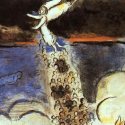
[ The following is related to this week's Torah reading (Beshalach). Please read the Torah portion to "find your place" here.]
01.13.11 (Shevat 8, 5771) Exactly one month after the Exodus (i.e., Iyyar 15), the LORD led the Israelites from the oasis and palm trees at Elim into the deeper part of the desert, to midbar Sin (מִדְבַּר־סִין), a desolate region that was about midway to Sinai going southeast (Exod. 16:1). About this time, the food provisions the people had brought with them ran out, and the Israelites began grumbling against Moses and Aaron, saying: "If only we had died by the hand of God in the land of Egypt, when we sat by the pots of meat, when we ate bread to our fill, for you have brought us out into this desert to starve to death!" (Exod. 16:3). The LORD then said to Moses, "'Look I am going to rain down bread from heaven (לֶחֶם מִן־הַשָּׁמָיִם) for you. The people will go out and gather a portion for that day so that I might test whether they will walk in my Torah (תּוֹרָה) or not" (Exod. 16:4). Each Friday they received a double portion to last them through Shabbat, and the test (nisayon) centered on whether the people would refrain from seeking manna on God's appointed day of rest. Note that the Ten Commandments had not yet been given to Israel at this time, so it is likely that the test of manna was meant to prepare them for the law of the Sabbath that would be given at Sinai the following month (i.e., on Sivan 6, or Shavuot).
The bread from heaven was called manna (מָן) because when the people first saw it they asked one other, "mann hu" (מָן הוּא), "what is it?" Although the Torah describes its taste as like "honey cakes" (Exod. 16:31), midrash says that the taste of manna was a function of a person's sense of gratitude. For those who were thankful, manna tasted delicious (like a good cookie?), but to those who murmured, it tasted bland and unsatisfying (like stale matzah?). "According to your faith, be it done unto you" (Matt. 9:29).
אָנכִי לֶחֶם חַיִּים הַיּרֵד מִן־הַשָּׁמַיִם
אָדָם כִּי־יאכַל מִלֶּחֶם הַזֶּה וָחַי לְעוֹלָם
a·no·khi le·chem cha·yim ha-yo·red min ha-sha·ma·yim.
a·dam ki yo·khal mi·le·chem ha·zeh va·chai le·o·lam

"I am the living bread that came down from heaven.
If anyone eats of this bread, he will live forever" (John 6:51)

Download Study Card
Since Yeshua called Himself the Bread of Life (לֶחֶם הַחַיִּים) who came down from heaven, I prefer to recite the Hebrew blessing over the bread (i.e., Hamotzi) as: "Blessed art Thou, LORD our God, Master of the universe, who brings forth the living bread from heaven":
בָּרוּךְ אַתָּה יְהוָה אֱלהֶינוּ מֶלֶךְ הָעוֹלָם
הַמּוֹצִאי לֶחֶם הַחַיִּים מִן הַשָּׁמַיִם
ba·rukh at·tah Adonai E-lo·hei·nu me·lekh ha-o·lam,
ha·mo·tzi le·chem ha-chai·yim min ha-sha·ma·yim

"Blessed Art Thou, LORD our God, King of the Universe,
who brings forth the living bread from heaven."
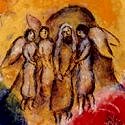
Download Study Card
Note: For more on the subject of manna, see the parashah-related article entitled, "Bread from Heaven," and the Passover article entitled, "Partaking of the Bread of Humilty."
Stepping out in faith...

[ The following is related to this week's Torah reading (Beshalach). Please read the Torah portion to "find your place" here.]
01.13.11 (Shevat 8, 5771) Exactly one year after Moses first encountered God at the burning bush at Sinai, the children of Israel left Egypt. Instead of leading Israel along a direct route to the Promised Land, however, the Torah states that God directed them south, into the desert, in order to avoid war with the Philistines (Exod. 13:17). The sages note that God chose "the way of the desert" (דֶּרֶךְ הַמִּדְבָּר) so that the people would learn to depend on Him alone to meet their needs (Deut. 8:3). The excursion into the desert also marked a period of "betrothal" or courtship, where Israel would learn the character of her Beloved more fully. The prophet Jeremiah later recalls Israel's passion for God during this time: "I remember the devotion of your youth, your love as a bride, how you followed me in the desert, to a land not sown (Jer. 2:2). Over two million people - men, women, and children - journeyed to "a land unsown" for sake of the Promise of God (for more on this, see "Love Story Exodus").
At the outset of their exodus from Egypt, the Israelites first traveled south from Raamses to the city of Sukkot, an Egyptian city near the eastern border. After this they went further south toward Etham, at the "edge of the desert," where the Shekhinah Glory appeared as a Pillar of Cloud by day (עַמּוּד עָנָן) and as a Pillar of Fire by night (עַמּוּד אֵשׁ) to lead them on their way (Exod. 13:20-22). According to Rashi, when one pillar would leave, the other would appear, providing them protection from the elements. The pillar of cloud would protect them from the heat of the sun of the desert; the pillar of fire would keep them warm and provide light at night.
When Pharaoh heard that the Israelites were camped at Etham, he thought they had lost their way and were hemmed in by the desert. The LORD then instructed Moses to lead the people back to encamp at a pagan sacred place named "Baal-Zephon" (בַּעַל צְפן), near the shore, so that they would appear to be trapped, in order to entice Pharaoh to pursue them. God intended to "lure" Pharaoh back for a final power encounter and to destroy the last vestiges of his idolatry: "And I will get glory over Pharaoh and all his host, and the Egyptians shall know that I am the LORD" (Exod. 14:1-4).
Three days after the Exodus (i.e., on Nisan 18) Pharaoh mobilized his army and pursued the Jews to bring them back. Perhaps Pharaoh felt "justified" in doing so, since by now he realized that the "three-day feast to the LORD" was really a permanent escape from his clutches (see Exod. 3:18; 5:3; 7:16; 10:24). After two days (i.e., on Nisan 20), Pharaoh and his army reached the Israelites while they were encamped before Baal-Zephon beside the sea (Exod. 14:9).
"When Pharaoh drew near, the people of Israel lifted up their eyes, and behold, the Egyptians were marching after them, and they feared greatly. And the people of Israel cried out (וַיִּצְעֲקוּ) to the LORD" (Exod. 14:10). In their panic the people then turned on Moses and blamed him for their predicament: "Is it because there are no graves in Egypt that you have taken us away to die in the wilderness? What have you done to us in bringing us out of Egypt? Is not this what we said to you in Egypt: 'Leave us alone that we may serve the Egyptians'? For it would have been better for us to serve the Egyptians than to die in the wilderness" (Exod. 14:11-12; cp. Exod. 5:21).
Moses then reassured the people that the LORD would deliver them, despite their terrifying circumstances: "The LORD will fight for you; [so] quit complaining!" (Exod. 14:14). Moses then apparently began pleading for God's intervention, but the LORD said to him, "Why are you crying out to me (מַה־תִּצְעַק אֵלָי)? Tell the children of Israel to move forward!" (Exod. 14:15). There is a time for prayer, and a time for action, and this was a time for action! Moses needed to move the people closer to the shoreline and prepare them for God's deliverance. The LORD then explained to Moses how he would lift up his staff over the sea and divide it so that the Israelites could cross through on dry ground, but when the Egyptians would attempt to follow they would be swallowed up by the returning sea (Exod. 14:16-18). The Angel of God (and the pillar of cloud) then moved to the back of the camp, coming between the army of Egypt and the Israelites. That night the Egyptians were enshrouded in darkness while the Israelites had light (Exod. 14:19-20). "Then Moses stretched out his hand over the sea, and the LORD drove the sea back by a strong east wind all night and made the sea dry land, and the waters were divided" (Exod. 14:21).
According to midrash, when Moses lifted his staff to divide the sea, at first nothing happened. The people waited anxiously at the seashore, wondering what to do. Finally, Nachshon ben Aminadav, a descendant of Judah (Num. 1:7), took action by stepping into the water and the winds began blowing to divide the waters (Shemot Rabbah). The miracle of kriat yam suf - the splitting of the sea - therefore resulted because someone took a step of faith before God revealed His power. "And the people of Israel went into the midst of the sea on dry ground, the waters being a wall (חוֹמָה) to them on their right hand and on their left" (Exod. 14:22). They marched across the sea all that night (i.e., Nisan 21), under the light of the Shekhinah Glory...
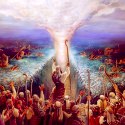
Another midrash states that after the waters were divided, the tribes began arguing among themselves as to which should go first. The tribe of Reuven argued that it should go first because it was first in birth order; the tribe of Ephraim argued it should go first because of the blessing of Jacob, and so on... While everyone was arguing, the tribe of Judah simply marched into the midst of the sea...
Just before dawn, the dark pillar of cloud that enshrouded the Egyptian army lifted, and the soldiers immediately rushed after the Israelites into pathway of the sea. The LORD looked down upon them "through the pillar of fire and cloud" (בְּעַמּוּד אֵשׁ וְעָנָן), however, and threw them into a panic, causing the wheels of their chariots to fall off and hindering their progress. God then told Moses to lift his staff again so that the waters would return to normal, thereby overwhelming the Egyptians with their chariots and horsemen. By the time dawn arrived, the Israelites saw the dead bodies of Pharaoh's army lining the seashore (Exod. 14:28-30). "Israel saw the great power that the LORD used against the Egyptians, so the people feared the LORD, and they believed in the LORD and in his servant Moses."
Moses and Miriam then composed the famous "Song of the Sea" (shirat hayam) and all Israel sang (and danced) together: "... The LORD is my strength and my song, and he has become my salvation; this is my God, and I will praise him, my father's God, and I will exalt him.... Who is like you, O LORD, among the gods? Who is like you, majestic in holiness, awesome in glorious deeds, doing wonders? ... The LORD will reign forever and ever" (Exod. 15:1-21).
מִי־כָמכָה בָּאֵלִם יְהוָה
מִי כָּמכָה נֶאְדָּר בַּקּדֶשׁ
נוֹרָא תְהִלּת עשֵׂה פֶלֶא
mi kha·mo·khah ba·e·lim Adonai?
mi ka·mo·kha ne·dar ba·ko·desh,
no·ra te·hi·lot o·seh fe·le?

"Who is like you, O LORD, among the gods?
Who is like you, majestic in holiness,
awesome in praise, doing wonders?

Download Study Card
A midrash states that as Miriam the prophetess was leading the people in the song, some of the angels began singing too, though the LORD stopped them: "How can you sing while my children are drowning?" (Talmud Megillah 10b). God objected to their praise because it lacked sensitivity to the suffering of human beings created in His image. The acknowledgment of the Egyptian suffering that made our liberation possible has given rise, in part, to the development the Passover tradition of spilling wine from our cups as we recite the ten plagues during the seder....
It is interesting that the Apostle Paul likened the crossing of the sea as a metaphor of baptism: "All were baptized into Moses in the cloud and in the sea" (1 Cor. 10:1-2,11). In the New Testament, baptism symbolizes our identification with Yeshua's death, burial, and resurrection (Col. 2:12; Rom. 6:3-5). The Israelites were facing death and were therefore at the "end of themselves." They had no other appeal or hope than God's gracious intervention on their behalf (i.e., salvation). Still, they needed to act and move forward. After they took the step of faith, they could see the Shekhinah Glory lighting up the way of deliverance, though this meant being "buried" within the midst of the sea. Their earlier fear of death was replaced with a song of God's great deliverance (shirat hayam). The other side of the sea represents new life in the Messiah, the life that comes from above, by the power and agency of the Holy Spirit... The Israelites died to their old life, were symbolically buried in the waters, but arose to new freedom by the grace and power of God... Shifting the analogy somewhat, the crossing of the sea represented a sort of "birth canal" into the realm of true freedom as God's redeemed children.
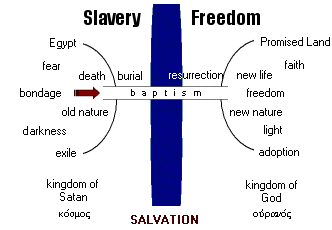 |
The Talmud says "Kashe l'zavgom k'kriat yam suf," which means it is more difficult for God to create a marriage than to split the sea. Why do the sages think it is so difficult for God to create a marriage? Because each person needs to take individual action to trust the other. Likewise with God. It is more difficult for God to get us to be in a genuine, trusting relationship with Him than it is for Him to split a sea. Of course the problem is not with God, who is the perfect "husband," but with our adulterous inner nature. It took the LORD a year to deliver Israel from Egypt, but it took Him 40 years to teach Israel to trust in His promises of love. God always awaits our teshuvah - our "answer" - to His invitation before He will reveal more to us. As Yeshua once said to his followers, "I still have many things to say to you, but you cannot bear them now" (John 16:12). Some things about God can only be known by stepping out in faith and surrendering ourselves entirely to Him....
Shalom for now, chaverim. May it please the LORD to help us answer the call of God's amazing love...
 |
Believing and Seeing...

[ The following is related to this week's Torah reading (Beshalach). Please read the Torah portion to "find your place" here.]
01.11.11 (Shevat 6, 5771) This week's Torah portion (parashat Beshalach) contains some of the most dramatic episodes recorded in all of the Scriptures. Here we read about the great exodus of the Israelites on the day of Passover and Pharaoh's last-ditch pursuit of the Hebrew slaves. We read how the Shekhinah Glory held back Pharaoh's host, how the LORD split the Sea of Reeds so that the Israelites could safely pass through the waters, and how Pharaoh's forces were all drowned in the sea. We further read how God personally led the Israelites into the desert and sustained them by transforming "bitter water" into sweet water, sending manna from heaven, and providing a miraculous water source from the rock that Moses struck. Yet despite all the miracles and wonders performed on behalf of the Israelites, the people inexplicably seemed to "forget" about their miraculous redemption. Indeed, it was just a few days after the awe-inspiring deliverance from Egypt that the people began to murmur, complain, and kvetch. The sorry state of the Israelites was so bad that the Midrash Rabbah plaintively wonders how it was possible that the Israelites could have so quickly forgotten all of God's miracles performed on their behalf....
The story of the disgruntled Israelites teaches us that miracles are never enough to sustain our faith. Seeing isn't believing, but rather the other way around.... This explains why those church groups that emphasis "signs and wonders" often contain so many exhausted people. Miracles are insufficient for faith; people get excited about them while they occur, but they soon forget them and return to a state of desperation and despair. Necessarily the cycle must repeat itself, with ever-increasing claims of the miraculous, in order to keep the illusion alive.... In light of this, it is wise to consider that the passion for "signs and wonders" may be little more than a counterfeit of the real need to surrender and serve God. After all, truly loving the LORD with all your heart, with all your soul, and with all your strength is the goal of faith. A heart of true faith, then, is a miracle of a greater kind than that of splitting the Sea of Reeds.
Regarding the case of the redeemed Israelites, what has struck some commentators is not so much the incredible signs and wonders that the LORD performed on behalf of Israel, but rather the people's persistent inability or unwillingness to believe... Some of the Jewish sages have gone so far as to say that the entire Bible may be read as a book about God's apparent inability to teach the Jewish people how to be grateful. The same might be said about some professing Christians we see today.
Lasting transformation of the soul comes from "following" the LORD God of Israel. As I've mentioned elsewhere, disciples of Yeshua are called talmidim (תַּלְמִידִים) -- a word that comes from lamad (לָמַד) meaning "to learn" (the Hebrew word for teacher is melamad (מְלַמֵּד) from the same root). In the Greek New Testament, the word for "disciple" is μαθητής (the word "math" comes from this), that is, a pupil of a διδάσκαλος, or a teacher. In other words, disciples of Yeshua are automatically "enrolled" in the school of truth, which is also a "school of suffering" (Col. 1:24). In the Torah, Korban Talmid (קָרְבַּן תָּמִיד) is the daily sacrifice offered to the LORD that corresponds to Korban Chai (קָרְבָּן חַי), being a "living sacrifice" to the LORD (Rom. 12:1-2). We must take up our cross daily (Luke 9:23). Yeshua plainly said: "For this purpose I was born and for this purpose I have come into the world -- to bear witness to the truth (ἵνα μαρτυρήσω τῇ ἀληθείᾳ). All who are of the truth listen to my voice" (John 18:37). It is hard to imagine a follower of Yeshua who does not love, study, and value the truth...
רֵאשִׁית חָכְמָה קְנֵה חָכְמָה וּבְכָל־קִנְיָנְךָ קְנֵה בִינָה
rei·shit choch·mah, ke·neh choch·mah, u·ve·khol kin·ya·ne·kha ke·neh vi·nah

"The beginning of wisdom is this: Get wisdom,
and whatever you get, get insight." (Prov. 4:7)

Download Study Card
The Hebrew word for education is chinukh (חִנּוּךְ), a word that shares the same root as the word for "dedication" (i.e., chanukah: חֲנֻכָּה). True education of the Scriptures is therefore foundational to being a student of the Messiah. We are called to "rightly divide" (ὀρθοτομέω, lit. "cut straight") the "word of truth (2 Tim. 2:15). Among other things, then, following Yeshua means becoming a student of the Jewish Scriptures that He loved and fulfilled (Matt. 5:17-18; Luke 24:44-45). Only after learning from Yeshua as your Teacher will you be equipped to "go to all the nations and teach" others (Matt. 28:19). This is accomplished not merely by explaining (propositional) doctrine but by kiddush HaShem -- sanctifying the LORD in our lives (1 Pet. 1:15-16). As the sages noted long ago: "Upon three things the world does stand: upon the Torah (truth), upon worship, and upon acts of lovingkindness" (Avot 1:2). We are called to be a "living letter" sent to the world to be "read" (2 Cor. 3:2-3).
It has been said that it was easier for the LORD to get Israel out of Egypt than it was for Him to get Egypt out of Israel... The LORD knew the process would be an arduous one, requiring 40 long years of study in the desert under the instruction of Moses, and yet despite all this the people "were unable to enter because of unbelief" (Heb. 3:19; 4:11; Psalm 95:7-11). This is a truly sobering warning, and we are encouraged to open our hearts to the miracle of God's love for us. "Today, if you hear His voice, do not harden your hearts." May it please God to help us make a new commitment to study and to live the truth of the Torah and Scriptures for the glory of His Name.
Torah and Healing...
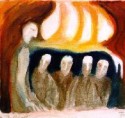
[ The following is related to this week's Torah reading (Beshalach). Please read the Torah portion to "find your place" here.]
01.11.11 (Shevat 6, 5771) In this week's Torah portion we read: "Diligently heed the voice of the LORD thy God, do what is right in His eyes, give ear to His commandments, and keep His decrees..." (Exod. 15:26). It might be helpful to break this verse down to get a better idea of what the LORD is saying:
- "Diligently heed." The very first part of this commandment is to "diligently heed (שָׁמוֹעַ תִּשְׁמַע) the Voice of the LORD thy God," which recalls the great Shema and the commandment to love the Lord with all your heart, soul, and possessions. The Mekhilta De-Rabbi Ishmael states that the "Voice of the LORD" (קוֹל יהוה) refers to the Ten Commandments, though it is clear it refer primarily to the Word of God (דְּבַר־אֱלהִים), "the voice speaking out of the midst of the fire" (i.e., Yeshua). The first thing required, then, is to humble yourself in order to listen to what God is saying... This involves "making space" within yourself to hear the Voice of the LORD.
- "Do what is right." The second part of this commandment is to "do what is right in God's eyes (וְהַיָּשָׁר בְּעֵינָיו תַּעֲשֶׂה). The Hebrew word yashar (יָשָׁר) means "straight" (as in a straight line) or "right." Because God is tov v'yashar (good and upright), he teaches his children to be yesharim (יְשָׁרִים), i.e., those who walk uprightly (Psalm 25:8). Indeed, the "way of the LORD" (דֶּרֶךְ יהוה) is "to do acts of charity and justice" (לַעֲשׂוֹת צְדָקָה וּמִשְׁפָּט) (Gen. 18:19). This is the "straight way" (derekh ha-yashar), or the "narrow path" that leads to life (Matt. 7:14). The yesharim are known by the good fruit of their lives (Matt. 7:15-23). The Mekhilta associates "doing what is right" with making God-honoring choices in our daily lives (1 Cor. 10:31).
- "Give ear to God's Commandments." The third part of this commandment involves "giving ear" to God's mitzvot (i.e., his commandments). The metaphor of "giving ears" is used to express the idea of active listening, and indeed the term oznaim (ears) is often used as a synonym for shema (hear) in the poetic books of the Scriptures. But notice that the object of our listening is God's commandments, His mitzvot (מִצְוֹה), which connects with the first part of the commandment to diligently heed the Voice of the LORD. There is a focus, in other words, to our listening, and that focus is upon the revealed will of God. We cannot "listen for the Voice of the LORD" apart from thoroughly hearing (and doing) His commandments. As the Apostle James admonished: "Don't deceive yourself (lit., "reason around" the truth, from παραλογίζομαι, from παρά, "around, beside" and λογίζομαι, "to reason") by merely hearing the truth of Scripture: Live it!" (James 1:22).
- "Keep God's Decrees." The decrees of God (חֻקִּים) are statutes given without an explictly defined reason or explanation. These laws can seem irrational to the sentiment of human logic. Zot chukat haTorah (זאת חֻקַּת הַתּוֹרָה) - "this is the Torah's decree...." is therefore a statement that God has commanded something and that settles the issue. Notice that this part of the commandment says we are to guard (i.e., shamar: שָׁמַר) these decrees of the Lord as something precious. "Keep (shamar) your heart with all vigilance, for from it flow the springs of life" (Prov. 4:24). The decrees of God often become associated with customs (minhagim) and rituals in our lives which help form a sense of identity and community.
Notice that the emphasis of this verse has to do with acts of obedience, or "deeds more than creeds." The Mishnah states: "It is not the explanation that is essential, but the deed itself." This mirrors the Apostle James' statement that "faith without works is dead" (James 2:17). Obedience to God is its own reward, since we are given more light as we obey: "If you know these things, happy are you if you do them" (John 13:17). Indeed Yeshua warned us, "Not everyone who says to me, 'Lord, Lord,' will enter the kingdom of heaven, but the one who does the will of my Father who is in heaven. On that day many will say to me, 'Lord, Lord, did we not prophesy in your name, and cast out demons in your name, and do many mighty works in your name?' And then will I declare to them, 'I never knew you; depart from me, you workers of lawlessness" (Matt. 7:21-23).
This is why we say, "Blessed are You, LORD our God... who sanctifies us with His commandments..." The giving of the commandments is a gift that enables us to walk in the righteousness of life (1 John 2:29). We don't "have to" do the commandments of God, but what a great joy it is to do so!
כִּי נֵר מִצְוָה וְתוֹרָה אוֹר
וְדֶרֶךְ חַיִּים תּוֹכְחוֹת מוּסָר
ki ner mitz·vah, ve'to·rah ohr,
ve·de·rekh cha·yim to·che·khot mu·sar

"For the commandment is a lamp, and the Torah is light,
and the reproofs of discipline are the way of life" (Prov. 6:23)
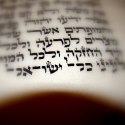
Download Study Card
It is clear from other Scriptures that we are not saved by means of law-keeping, of course, though on the other hand that does not excuse us from doing acts of righteousness. God did not "waste His breath" revealing the principles of righteousness to the Jewish people, and therefore we are to "study to show ourselves approved unto God" (2 Tim. 2:15). The "law of the Spirit of life in Yeshua" (תּוֹרַת רוּחַ הַחַיִּים בְּיֵשׁוּעַ) empowers to serve God according to a new principle of freedom. After all, true freedom doesn't mean doing "whatever you want," but rather means the power to choose contrary to the demands of your lower nature. We "put off" the old self and "put on" the new (Eph. 4:22-24). It is the divinely imparted "new nature" that gives us the power to "put to death" the old self by reckoning it crucified with Messiah (Gal. 2:19-20). Obedience to the Torah of Yeshua leads to further revelation, just as disobedience to it leads to further darkness (Matt. 13:12). Yeshua is only the "Author of Eternal Salvation" for those who heed and obey Him (Heb. 5:9). "If we live by the Spirit, let us also walk by the Spirit" (Gal. 5:25).
מִכָּל־מִשְׁמָר נְצר לִבֶּךָ
כִּי־מִמֶּנּוּ תּוֹצְאוֹת חַיִּים
mi·kol mish·mar ne·tzor lib·be·kha,
ki mi·me·nu to·tze·ot cha·yim

"Above all things guard your heart,
for from it are the contours of life" (Prov. 4:23)

Download Study Card
For the follower of Yeshua, much of this process is "unconscious," by which I mean that it happens as a result of God's grace (χάρις, a word related to χαρά, "joy") over time.... As we learn to see the beauty of God's Torah, we will spontaneously and joyfully seek to do those things that please our LORD and Master. As the Apostle John wrote: "For this is the love of God, that we keep his commandments. And his commandments are not burdensome (lit. "heavy," βαρύς) (1 John 5:3).
Finally, our verse concludes with the declaration that honoring God's Torah leads to our personal healing. We understand God as Adonai Rophekha (יְהוָה רפְאֶךָ), "the LORD our Healer," when we heed the message and truth of the Torah in our lives (Exod. 15:26).
Parashat Beshalach - Healing
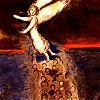
[ The following is related to this week's Torah reading (Beshalach). Please read the Torah portion to "find your place" here.]
01.10.11 (Shevat 5, 5771) After the great deliverance of Israel at Yam Suf, the "Sea of Reeds," Moses led the people into the desert. After traveling three days without finding any water, however, the Israelites finally arrived at place they named Marah ("bitter"), because the water there was undrinkable. The people began to complain and Moses asked the LORD for help. The LORD then showed Moses a tree which he was to throw into the bitter waters. Miraculously, the water turned sweet so the people could drink. Immediately following this episode, the LORD admonished Israel and gave them decree and a judgment (חק וּמִשְׁפָּט) in order to test them:
אִם־שָׁמוֹעַ תִּשְׁמַע לְקוֹל יְהוָה אֱלהֶיךָ וְהַיָּשָׁר בְּעֵינָיו תַּעֲשֶׂה
וְהַאֲזַנְתָּ לְמִצְוֹתָיו וְשָׁמַרְתָּ כָּל־חֻקָּיו כָּל־הַמַּחֲלָה אֲשֶׁר־שַׂמְתִּי
בְמִצְרַיִם לא־אָשִׂים עָלֶיךָ כִּי אֲנִי יְהוָה רפְאֶךָ
im sha·mo·a tish·ma le·kol Adonai E·lo·he·kha, ve·ha·ya·shar be·ey·nav ta·a·seh,
ve·ha·a·zan·ta le·mitz·vo·tav, ve·sha·mar·ta kol chu·kav, kol ha·ma·cha·lah a·sher sam·ti ve·mitz·ra·yim lo a·sim a·ley·kha, ki ani Adonai rof·e·kha

"If you will diligently listen to the voice of the LORD your God,
and do that which is right in his eyes, and give ear to his mitzvot
and keep all his decrees, I will put none of the diseases on you
that I put on the Egyptians, for I am the LORD, your healer" (Exod. 15:26).
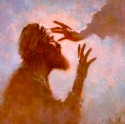
It is interesting to note that the Hebrew verb used to describe "The LORD your healer" (i.e., rapha: רָפָא) is later used to describe Egypt's eventual return to the LORD: "And the LORD will strike Egypt, striking and healing, and they will return (שׁוב) to the LORD, and he will listen to their pleas for mercy and heal them" (Isa. 19:22). Healing, in other words, ultimately concerns teshuvah - that is, turning to the LORD God of Israel for salvation. It is interesting to note that the LORD directed the people away from Marah south to an idyllic oasis named Elim (אֵילִמָה) where there were "twelve springs of water and seventy palm trees." Perhaps Elim was a foretaste of olam haba, the world to come, when healing will be for all Israel as well as for the 70 nations of the earth (Rev. 22:2).
Of course our ultimate healing is comes through Yeshua, the Son of God and Savior of the world (מוֹשִׁיעַ הָעוֹלָם). As it is written by the prophet Isaiah: "He [Yeshua] was pierced for our transgressions; he was crushed for our iniquities; upon him was the chastening that brought us peace, and with his stripes we are healed" (Isa. 53:5):
וְהוּא מְחלָל מִפְּשָׁעֵנוּ מְדֻכָּא מֵעֲוֹנתֵינוּ
מוּסַר שְׁלוֹמֵנוּ עָלָיו וּבַחֲבֻרָתוֹ נִרְפָּא־לָנוּ
ve·hu me·cho·lal mi·pe·sha·ei·nu, me·duk·ka me·a·vo·no·tei·nu
mu·sar she·lo·mei·nu a·lav, u·va·cha·vu·ra·to nir·pa-la·nu

"But he was pierced for our transgressions; he was crushed for our iniquities;
upon him was the chastening that brought us peace,
and with his stripes we are healed" (Isa. 53:5)
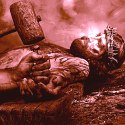
Download Study Card
Notice that the word translated "stripe" (i.e., חַבּוּרָה, "wound" or "blow") comes from the same root as the word "friend" (חָבֵר) and therefore we can read this as "in His friendship we are healed." Yeshua gave up His life for us so that we could become his friends... As He later told us regarding his sacrifice: "Greater love has no one than this, that one lay down his life for his friends" (John 15:13). Indeed of Yeshua it may truly be said, Yesh ohev davek me'ach – "there is a friend who sticks (davek) closer than a brother" (Prov. 18:24).
Parashat Beshalach - Shirat Hayam

[ The following is related to this week's Torah reading (Beshalach). Please read the Torah portion to "find your place" here.]
01.10.11 (Shevat 5, 5771) The Torah reading for this week (Beshlach) includes the famous Shirat Hayam (שִׁירַת הַיָּם), the "Song the Sea," a hymn of praise the Israelites sang to the LORD after they miraculously crossed the Sea of Reeds (i.e., Yam Suf: יָם סּוּף). Shirat Hayam is traditionally sung on the 7th day of Passover (i.e., on Nisan 21) since it was first sung seven days after the people left Egypt. When the Temple stood in Jerusalem, Shirat Hayam was sung every day by the Levites during the minchah (afternoon) offering. After the Temple was destroyed, however, the song was incorporated into the shacharit (morning) service of the synagogue (i.e., Mi Chamocha, etc.) to fulfill the Torah's commandment to "remember the day of your departure from the land of Egypt all the days of your life" (Deut. 16:3). Today the Sabbath on which Beshalach is recited is called Shabbat Shirah ("Sabbath of the Song") and the congregation all rises when the Song of the Sea is chanted.
The song begins:
אָשִׁירָה לַיהוה כִּי־גָאה גָּאָה
סוּס וְרכְבוֹ רָמָה בַיָּם׃
עָזִּי וְזִמְרָת יָהּ וַיְהִי־לִי לִישׁוּעָה
זֶה אֵלִי וְאַנְוֵהוּ אֱלהֵי אָבִי וַאֲרמְמֶנְהוּ׃
יהוה אִישׁ מִלְחָמָה יהוה שְׁמוֹ׃
a·shi·rah la-Adonai ki ga'oh ga'ah,
sus ve·ro·khe·vo ra·mah ba·yam.
o·zi ve·zim·rat Yah, va·hi-li li·shu·ah,
zeh E·li ve·an·ve·hu, E·lo·hei a·vi va·a·ro·me·nu.
Adonai ish mil·cha·mah, Adonai she·mo

"I will sing to Adonai, for he has triumphed gloriously;
the horse and his rider he has thrown into the sea.
Yah is my strength and my song, and he has become my salvation;
this is my God, and I will enshrine Him, my father's God, and I will exalt him.
The LORD is a warrior; the LORD is his Name." (Exod. 15:1-3)

Download Study Card
Notice that the Hebrew text is stylized in a special way according to soferut (scribal) tradition. The Talmud (Megillah 16b) states that Shirat Hayam must be written in the form of "a half brick over a whole brick, and a whole brick over a half brick," that is, with alternating half-lines, to resemble "building a house."
 |
According to Yalkut Me'am Lo'ez, the blank spaces separating the "bricks" (i.e., text blocks) suggest "blank spaces in our knowledge and praise of God" which we are encouraged to add to the "building." The alternating "bricks" also resemble waves of water... The sages count 198 words in this song, which is the numerical value for the word tzchok (צחק), a word that means "laughter" and is the word used to describe Sarah's response when she finally gave birth to Isaac (Gen. 21:6). According to Rabbi Bahye, the laughter in Isaac's name comes from Abraham's joy (Gen. 17:17). The joy of Isaac's birth, then, is linked with the "birth" of the nation of Israel at the time of the Exodus.

It is also noteworthy to remember that the Lord Yeshua was the One who saved Israel on that very day. He is the Angel of the LORD and YHVH the Redeemer, as Moses likewise stated: וַיּוֹשַׁע יהוה בַּיּוֹם הַהוּא אֶת־יִשְׂרָאֵל מִיַּד מִצְרָיִם / "On that day, the LORD saved Israel from the hand of the Egyptians" (Exod. 14:30).
Parashat Beshalach - בשלח

[ It's been said that all the signs and wonders performed during the Exodus served two purposes: 1) to convince the Egyptians of the greatness of God, and 2) to convince the Israelites of the same thing.... ]
01.09.11 (Shevat 4, 5771) The Torah reading for this week is parashat Beshalach, the fourth of the Book of Exodus. Here again we read about how the wicked Pharaoh hardened his heart by ordering his armies to pursue God's newly redeemed people. This resulted in further disaster for Egypt but great glory to the LORD God of Israel...
After the Israelites left Egypt, the LORD did not lead them along the most direct route to the land of Canaan (through territory occupied by the Philistines), but rather toward Yam Suf - the Sea of Reeds. The LORD led the way for the Israelites in a Pillar of Cloud (עַמּוּד עָנָן) by day and a Pillar of Fire (עַמּוּד אֵשׁ) by night, and had them "turn back" from Etham toward Egypt to encamp before Baal-Tzefon (בַּעַל צְפן) - an Egyptian idol - by the Red Sea, so that Pharaoh would be led to believe that the Israelites were lost in the wilderness (according to rabbinic literature, this idol - the only one that remained undestroyed after God sent the tenth plague upon Egypt - was intentionally spared by God in order to "bait" Pharaoh into thinking that the God of Israel was powerless over him).
When the Egyptian calvary caught up to them, the Israelites were trapped against the sea, and the people were terrified that they were to be slaughtered. God then moved the Pillar of Cloud so that it stood between the Egyptians and the Israelites. The Cloud grew black and the Egyptian cavalry could no longer see the Israelites. Meanwhile, a Pillar of Fire appeared in front of the people, lighting their way. Moses then raised his staff and a strong east wind blew and divided the waters, forming a wall of water on the right and left, and the Israelites began to cross safely.
According to Midrash, the sea formed a "tent" over the heads of the Israelites, protecting them on all sides. Moreover, the waters divided into twelve tunnels, one for each tribe. The walls of the water were perfectly clear, like translucent glass, so that the tribes could see one another as they crossed.... Another midrash says that all of the waters of the earth split at the same time as the Sea of Reeds - including rivers and lakes around the world.
At any rate, by daybreak all of the Israelites had safely reached the other side, and the Pillar of Cloud lifted. The Egyptians then began to follow in pursuit, but the ground beneath them turned to mud and the wheels of their chariots became stuck (this is considered retribution for forcing the Israelites to make bricks of mortar without straw). As the Egyptians attempted to retreat, Moses stretched out his staff and the wall of waters collapsed over them. The Israelites watched in awe as the waters engulfed all of Pharaoh's mightiest warriors. There were no survivors.
Overjoyed that they no longer need fear Pharaoh, the people began to cheer and rejoice. Then Moses composed a great song (Exod. 15), a spontaneous hymn of praise and thanks to the LORD for Israel's deliverance (the song opens with "I will sing..." and apparently will also be sung in the Heavenly Jerusalem: see Rev. 15:3). Miriam, Moses' sister led Israel in a dance of victory, "Sing to the LORD, for he has triumphed gloriously; the horse and his rider he has thrown into the sea."
Moses then led the people away from the sea, into the desert. After three days without finding water, the Israelites finally arrived at Marah ("bitter"), a place where the water was undrinkable. The people complained and Moses asked the LORD for help. The LORD then showed Moses a tree which he was to throw in the bitter waters. Miraculously, the water turned sweet so the people could drink.
In the second month of their travel through the desert, the matzah that the Israelites brought with them ran out. The people again began to complain to Moses. After Moses prayed, the LORD sent food from heaven - manna - which appeared as the morning dew every day (except for Shabbat). According to midrash, when Moses first instructed the people to gather a double portion on Friday to prepare for Shabbat, Dathan and Abiram wanted to prove him a liar and rose early Shabbat morning to secretly scatter manna on the ground. However, the birds came and ate it all up and when the Israelites went out to gather manna, they could not find any (an old custom in synagogue is to scatter bread on Shabbat Shirah, in memory of the birds). Another midrash says that the double portion of manna that fell on Friday had a better taste and smell than the manna that fell on the other days. It also would not rot like any leftover manna collected on other days. The manna was said to have had no taste, but was entirely a product of aroma (the Mem and Nun are both nasal letters in Hebrew): If a person was righteous, the food was said to taste heavenly, but if they were unbelieving or complaining, it was said to taste entirely bland.
As the people continued traveling through the desert, they arrived at Rephidim and complained that they were running out of water. Some even threatened to stone Moses to death. Moses then asked the LORD for help and was instructed to take the leaders outside the camp to watch him strike a rock with his staff (according to Midrash, God wanted witnesses to confirm that there had been no well there all along). When he did, fresh water flowed forth and the people were refreshed. The name of the place was called "Massah and Meribah" (מַסָּה וּמְרִיבָה) - "testing and arguing" - because there the Israelites tested God and argued with Moses.
The parashah ends with the unprovoked attack of a warlike and nomadic tribe called the Amalekites while Israel camped at Rephidim (Amalek may have been a grandson of Esau and chief of an Edomite tribe (Gen. 36:12, 16), though he is also described as "first among the nations," perhaps predating the time of Abraham (Gen. 14:7, Num. 24:20)). Joshua (יְהוֹשֻׁעַ), Moses' assistant, was put in charge of the defense of Israel. Moses ascended a hilltop with Aaron and Hur (thought by some to be Miriam's son from Caleb). As the battle raged, whenever Moses held up his hands, the Israelites prevailed, but when he tired, they began to lose. Aaron and Hur then had Moses sit down and held his arms up for him. By sunset, Joshua had defeated the Amalekite armies. The LORD then vowed to one day wipe out the descendants of Amalek. (To this day, the soferim blot out the name Amalek to test their quill before writing a Torah scroll, and the Amalekites are regarded as the perpetual enemies of Israel. Some regard Haman, Hitler, and other anti-Jewish people as "Amalekites"). Moses then built an altar he called Adonai Nissi (יהוה נִסִּי), "The LORD is my Standard (or Banner)," in commemoration of his raised arms as a sign for God's sustenance of Israel (note that "hand upon the throne (עַל־כֵּס)" [v. 17:16] could be rendered as "hand upon the standard" (עַל־נֵס) through copyist error).
 |
New Shabbat "Table Talk" Guide
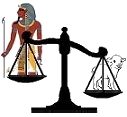
[ The following is related to this week's Torah reading (Bo). Please read the Torah portion to "find your place" here.]
01.07.11 (Shevat 2, 5771) It is encouraging to discuss the weekly Torah portion with your family and friends during the Friday night Sabbath meal. To make it easier to discuss some topics, I created a new Shabbat "Table Talk" guide for parashat Bo. The guide includes a brief summary of the Torah portion, a few questions (with answers), and some additional topics for discussion. You can download the table talk page here.
Shabbat Shalom, chaverim. Please remember this ministry in your prayers... Thank you!
The Sacred Calendar
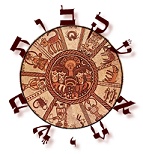
[ The following is related to this week's Torah reading (Bo). Please read the Torah portion to "find your place" here.]
01.06.11 (Shevat 1, 5771) It's been said that "the liturgy of the Jew is his calendar." Today is Rosh Chodesh Shevat, which reminds us again of the sacred calendar that is revealed in the Torah. In fact, the very first commandment given to the nation of Israel (as opposed to the patriarchs or to individual leaders such as Moses) was to sanctify the new month of redemption: "This month shall be the head of the months (i.e., Rosh Chodashim) for you. It shall be the first month of the year for you" (Exod. 12:2). This implies that our corporate identity as the redeemed people of God begins with a shared consciousness of time from God's perspective. All of the mo'edim (festivals of the LORD) are reckoned using the calendar that was revealed to the redeemed Israelite nation. As the psalmist later declared: "He made the moon for the appointed times" (Psalm 104:19). And since Yeshua came to perfectly fulfill the meaning of these appointed times, it is clear that he observed this calendar as well (Gal. 4:4-5).
עָשָׂה יָרֵחַ לְמוֹעֲדִים שֶׁמֶשׁ יָדַע מְבוֹאוֹ
a·sah ya·re·ach le·mo·a·dim, she·mesh ya·da' me·vo·o

"He made the moon to mark the appointed times;
the sun knows its time for setting" (Psalm 104:19)
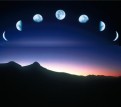
Download Study Card
Our Torah portion this week states that the Jewish people were in Egypt 430 years, b'etzem hayom (בְּעֶצֶם הַיּוֹם) - "to the selfsame day" (Exod. 12:40-41). According to tradition, Moses encountered the burning bush at Sinai on the 15th day of the month of Aviv (i.e., Nisan), and the Exodus from Egypt occurred exactly one year later, on Nisan 15. Passover therefore commemorates the "appointed time" when God would redeem His people:
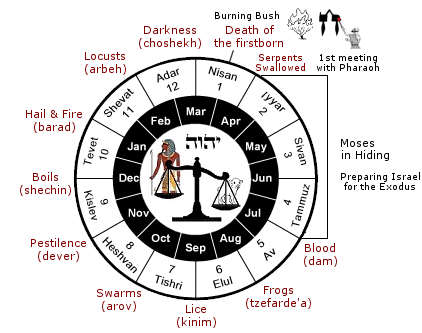 |
Leil Shimurim - A Night to be Guarded
"At the end of 430 years, on that very day (i.e., Nisan 15), all the hosts of the LORD went out from the land of Egypt" (Exod. 12:41). Immediately after stating this, the Torah refers to Passover as leil shimurim (לֵיל שִׁמֻּרִים), a "night to be guarded" (from the verb shamar, which means "to watch" or "to guard"). "It is a night that is guarded by the LORD to take them [Israel] out of Egypt; this night remains a night to be guarded by the people of Israel throughout their generations" (Exod. 12:42). Since "this night" - ha-lailah hazeh - was guarded by God from the beginning to be the time of redemption, Israel must therefore "guard this night" by by means of the Passover Seder (Exod. 13:10; Deut. 16:1). The festival of Passover recalls and celebrates God's faithfulness and redemptive love.
According to midrash, the phrase leil shimurim literally means "night of the watches" (shimurim is in the plural) which appears twice in this verse, and therefore it refers not only to the original redemption in Egypt (i.e., the Passover), but also to the time of future redemption by the Messiah (Shemot Rabbah 18). This explains why this night is guarded for all generations. The Babylonian Talmud (Tractate Rosh Hashanah 11a) further states: "In Nisan our forefathers were redeemed from Egypt, and in Nisan we will be redeemed." In that sense, Nisan is called Chodesh ha-Yeshuah (חדֶשׁ הַיְשׁוּעָה), the "month of the salvation," both in terms of the physical deliverance from Egypt, but more profoundly in terms of the spiritual salvation given through the Messiah Yeshua, who was crucified as the "Lamb of God" precisely during this time...
The LORD is a God of order, and the appointed times were intended to reveal prophetic truth about His salvation. The Exodus is perhaps the most fundamental event of Jewish history. In addition to being commemorated every year during Passover (Exod. 12:24-27; Num. 9:2-3; Deut. 16:1), it is explicitly mentioned in the first of the Ten Commandments (Exod. 20:2), and it is recalled every Sabbath (Deut. 5:12-15). The festivals of Shavuot and Sukkot likewise derive from it (the former recalling the giving of the Torah at Sinai and the latter recalling God's care as the Exodus generation journeyed from Egypt to the Promised Land). Indeed, nearly every commandment of the Torah (including the laws of the Tabernacle and the sacrificial system) may be traced back to the story of the Exodus. Most importantly, the Exodus prefigures and exemplifies the work of redemption given through the sacrificial life of Yeshua the Messiah, the true King of the Jews and the Lamb of God.
The very first occurrence of the word "Torah" in the Scriptures refers to the obedient faith of Abraham (Gen. 26:5), and the second occurrence refers to the law of Passover: "There shall be one law (תּוֹרָה) for the native and for the stranger who sojourns among you" (Exod. 12:49). There is a link between these two occurrences. Abraham lived before the time the Exodus, of course, and therefore the he obeyed the law of Passover by means of the Akedah (the sacrifice of his "only begotten" son Isaac). Despite offering his son up upon the altar at Moriah, Abraham believed in the LORD and it was credited to him as tzedakah (righteousness). Abraham's obedience revealed that the inner meaning of Torah is that the "righteous shall live by faith" (Hab. 2:4, Rom. 1:17). The Torah of Passover (תּוֹרַת פֶּסַח) likewise teaches that redemption from death is possible through the exchange of an innocent sacrificial victim. The blood of the Passover was "a sign" of imputed righteousness that was obtained entirely by faith. This is the "korban" principle of "life-for-life" that underlies the Torah of the sacrificial system of the Tabernacle as well. Ultimately all true Torah points to Yeshua, who is the divinely appointed Redeemer and the beginning and goal of all of creation... "When the fullness of time (τὸ πλήρωμα τοῦ χρόνου) had come, God sent forth his Son, born of woman, born under the Torah, to redeem those who were under the Torah, so that we might receive adoption as sons" (Gal. 4:4-5).
Chodesh tov, chaverim!
 |
Blood on the Doorposts
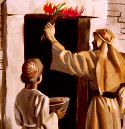
[ The following is related to this week's Torah reading (Bo). Please read the Torah portion to "find your place" here.]
01.05.11 (Tevet 29, 5771) In our Torah portion this week, we saw how the Israelites were commanded to slaughter the Passover and daub its blood on the two sides and top of the doorway of their houses (Exod. 12:7). The LORD would then see the blood and "pass over" their dwellings during the plague of the death of the firstborn. Based on this description, we might assume the blood was put on the outside of the door, though Rashi reasoned that it was placed on the inside, where they themselves could see it as a sign for them (i.e., הָיָה הַדָּם לָכֶם לְאוֹת [Exod. 12:13]). Indeed, after the blood was applied, the doors were shut and no one was permitted to leave the house until the following morning (Exod. 12:22). The blood of the sacrifice was intended to be seen as a sign for those who were trusting in the redemption of God. Likewise, by faith we apply the blood of the lamb to the "inside" of our hearts...
Some have claimed that God intended the blood to be smeared on the doorway in the shape of a cross (represented by the pictogram for the letter Tav, which means "sign"). However, it is difficult to see how the shape of this pictogram resembles the outline of a doorway. Moreover, it is likely that the ancient Israelites wrote using ktav Ivri, which does not have a letter that resembles either a cross or a doorway. In Biblical Hebrew (called ketav Ashurit), the letter that most clearly resembles a doorway is the letter Chet (ח). This letter, signifying the number 8, is connected with the word chai (חי), short for chayim (חיים), "life." Based on this connection, a drash could be made that the blood of the lamb (דַּם הַשֶּׂה) not only saved from the judgment of death but it also symbolized divine life.
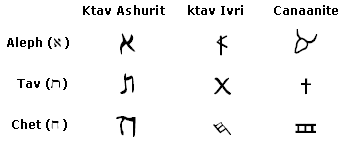 |
At any rate, there is no need to try to find a "literal sign" formed by the smearing of the blood, since the blood of the sacrifice itself was the sign that foreshadowed the greater sacrifice of Yeshua as the Lamb of God (שֵׂה הָאֱלהִים). In other words, it is clear that the sacrifice of Yeshua completely fulfills and reveals the inner meaning of Passover.
הִנֵּה שֵׂה הָאֱלהִים הַנּשֵׂא אֶת־חַטַּאת הָעוֹלָם
hin·nei seh ha·E·lo·him, han·no·sei et-cha·tat ha·o·lam

"Behold the Lamb of God
who takes away the sin of the world!" (John 1:29)
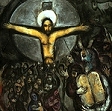
Download Study Card
רָאוּי הַשֶּׂה הַטָּבוּחַ לְקַבֵּל גְבוּרָה
עשֶׁר וְחָכְמָה וְכּחַ וִיקַר וְכָבוֹד וּבְרָכָה
ra'uy ha·seh ha·ta·vu·ach le·ka·bel ge·vu·rah,
o·sher ve·chokh·mah, ve·ko·ach vi·kar, ve·kha·vod uv·ra·kha

"Worthy is the Lamb who was slain, to receive power and wealth and wisdom
and might and honor and glory and blessing" (Rev. 5:12)

Download Reading Card
Ultimately, the story of the Exodus - and the deliverance indicated by the blood of the lamb - reveals the drama and glorious redemption of Yeshua, the Redeemer of Israel (יהוה גּאֵל יִשְׂרָאֵל) and Savior of the world.
Note: I am busy writing a new "Shabbat Table Talk" for Parashat Bo, though I hope to add some additional commentary on this portion of Torah later. Shalom for now, chaverim.
The Power of Hope...
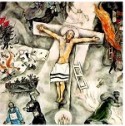
[ The following entry is based on a difficult conversation I had (yesterday) with someone who told me they were angry with God... Please skip it if you do not find it helpful, chaverim. ]
01.05.11 (Tevet 29, 5771) Is it ever appropriate to be angry at God? Recently I talked with a woman who had experienced various kinds of hardship in her life. Her father died when she was young and she was raised by an alcoholic and distant mother. She later married (and eventually divorced) a man who was abusive and emotionally unavailable to her. Her children suffered terribly from debilitating mental illness and insecurities. In light of all this, she defended her "right" to be angry at God and to question His goodness (to her). It was "safer" for her to consciously keep her distance from God, perhaps because she was afraid of being hurt once again.... Sadly, her ongoing sense victimization was more important to her than any promise of a future and hope (Jer. 29:11)... Today she remains "stuck" within the pain of her past and is offended by the idea that God personally loves her. Perhaps you know someone who has a similar struggle?
Of course Jewish post-Holocaust theology (i.e., "theology after Auschwitz") has wrestled with these sorts of harrowing and disturbing questions, though on a far larger and more traumatic scale. How could an all-loving, all-knowing, and all-powerful God allow (or permit) the horrors of the Shoah? For many Jews, the Holocaust marked the practical end of their faith, while for others it marked the start of a "theology of protest." In either case, however, the horrific reality of the Holocaust requires an authentic response from all of us. Providing an intellectual theory about the "problem of evil" seems empty and even irreverent in the face of such unspeakable acts of cruelty. Beware of any theology that denies the reality and heartache of human suffering. Yeshua offered up "loud cries and tears" during the days of his flesh, and he wept over the pain others experienced (Heb. 5:7, John 11:35).
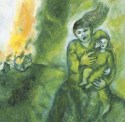
Notice that this problem is not one regarding God's existence or His perfect attributes, since it is assumed that God exists and is supremely good, powerful, and wise. Indeed, the problem of evil is essentially a problem of faith. It results from the collision between the real world and the ideal world, or between the present world and the promised world to come... Those who utterly abandon their faith no longer struggle with the "problem of evil" (or the "problem of goodness," for that matter), since presumably the "is/ought" dichotomy of life is resolved in despair. Genuine faith, on the other hand, results in a form of "protest" over this world and a resounding call for lasting hope to be realized.... Choosing to live in light of this hope is to live the "good fight of faith" (ἀγῶνα τῆς πίστεως).
In Fyodor Dostoyevsky's novel The Brothers Karamazov (1880), Ivan Karamazov argued with his devout brother Alyosha regarding the nature of faith. Ivan intellectually accepted God's existence, His wisdom, and His heavenly goal to ultimately save an alienated world, but he nonetheless challenged the idea that any future good -- even if it should be "beyond all the heart's imaginings" (1 Cor. 2:9) -- could ever "atone for" the present evil and manifold suffering found in this world. To make his point, Ivan needed to find just one case of entirely "gratuitous evil" - an irrefutable counterexample to the viewpoint that this is the "best of all possible worlds." He therefore listed a number of cases of extreme and excessive cruelty in the world, but he finally focused on a heart-wrenching account of a five year old girl who was chained to an outhouse and left to die in the Russian winter. No matter what might be offered in the way of "defense" of God, no "future good" could possibly justify the suffering of this child. Despite the sanctimonious theory that God will one day "wipe away every tear," Ivan stated that he could never accept the nature of this-worldly reality: "I refuse to accept this world of God's... Please understand, it is not God that I do not accept, but the world he has created. I do not accept God's world and I refuse to accept it." Commenting on this statement, Albert Camus writes, "If evil is essential to divine creation, then creation is unacceptable. Ivan will no longer have recourse to this mysterious God, but to a higher principle - namely, justice. He launches the essential undertaking of rebellion, which is that of replacing the reign of grace by the reign of justice" (The Rebel, 1951).
Since Ivan's lack of acceptance is so profound, let us ask a provocative question: What is it that may transform a theology of rebellion into a protest of hope? Ivan was unwilling to accept the world's evil as "the price of admission" into the world to come, and therefore he consciously chose to rebel against the very existence of the universe itself (symbolized as the world under God's control). His appeal to a sense of "justice" functioned as a rejection of God's sovereign plans. But why didn't Ivan instead choose to regard the world "under protest" and to appeal to God to intervene in its affairs? Why did Ivan give up the idea of hope and sink under the weight of an insoluble despair?
And he told them a parable to the effect that they ought always to pray and not lose heart. He said, "In a certain city there was a judge who neither feared God nor respected man. And there was a widow in that city who kept coming to him and saying, 'Give me justice against my adversary.' For a while he refused, but afterward he said to himself, 'Though I neither fear God nor respect man, yet because this widow keeps bothering me, I will give her justice, so that she will not beat me down by her continual coming.'"
And the Lord said, "Hear what the unrighteous judge says. And will not God give justice to his elect, who cry to him day and night? Will he delay long over them? I tell you, he will give justice to them speedily. Nevertheless, when the Son of Man comes, will he find faith on earth?" (Luke 18:1-8)
In this parable, Yeshua likens God to an "unrighteous judge" who neither feared God nor man. However, it was on account of the persistence of the widow's protest that he finally relented in his indifference and acted on her behalf.
עַד־אָנָה יְהוָה תִּשְׁכָּחֵנִי נֶצַח
עַד־אָנָה תַּסְתִּיר אֶת־פָּנֶיךָ מִמֶּנִּיָ
ad a·nah Adonai tish·ka·chei·ni ne·tzach?
ad a·nah tas·tir et-pa·ney·kha mi·me·ni?

"How long, O LORD? Will you forget me forever?
How long will you hide your face from me?" (Psalm 13:1)
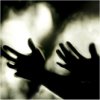
Download Study Card
Why were so many of the great tzaddikim of faith chosen to suffer? God troubled them in order to cause them to seek His face. Rabbi Bahya said that the prayer is the goal all along, and suffering or hardship was a divinely appointed means to that end.
By itself, doubt is not an evil thing. Faith is not defined by certainty, after all, but by courageous trust (אֱמוּנָה). In this week's Torah portion, we see Pharaoh - the consummate unbeliever - persisting in his unbelief despite the miraculous "signs and wonders" the LORD had manifested before his very eyes. Some of the commentators have said that the phrase "God hardened Pharaoh's heart" means that God (eventually) took away his freedom to choose (i.e., by ratifying his rebellious attitude so he had no further choice). Others, however, have said that the phrase can be understood to mean that "God strengthened Pharaoh's heart" so that he was enabled to doubt, since without the freedom to question we are unable to make a genuine decision...
I once heard the following statement: "The optimist believes that this is the best of all possible worlds; the pessimist believes the optimist is right..." The facts remain the same for both, but what is different is something within the heart, something that moves the will to no longer recoil from the world but rather to accept it.... Faith is a type of courage, a willingness to take risks, even in the midst of ambiguity. It surrenders to God's plan and will, even if that plan makes no rational sense at the moment. Of course it is intellectually "safer" to abstain from such trust and to yield to a "hermeneutic of suspicion." It is woefully easy to play the skeptic, to toy with ultimate questions, to affect intellectual superiority -- but at what cost? Is the supposed "defense" against being mistaken more important the risk of commitment? But such an approach to life is a essentially a form of cowardice. Without risk, we would never marry, have children, or take hold of our dreams. Some people might dismiss the dream of God's love as nonsense and futility, but the Scriptures make it clear that such hope represents the very substance (ὑπόστασις) of our faith (Heb 11:1).

There is a "false zeal" that leads people to estrangement and confusion. Withholding acceptance of the universe (or worse - withholding acceptance of others) is ultimately grounded in an abstract sense of "justice." However, justice itself cannot stand alone, since God Himself is the Source and Standard of all true justice. Those who invoke the ideal of justice therefore implicitly call upon the God of Justice and Truth as their ally. Among other things this implies that blaming "God" or accusing Him of being unjust is a "category" mistake. God cannot be unjust - by definition - and therefore an accusation that God is unjust is really an accusation against an idol of the mind. There is no "higher court of appeal" in the case of the LORD, and ultimately, how we choose to see is our own responsibility. We cannot "suspend" judgment indefinitely. As Yeshua taught us: "Forgive us...as we forgive...", which means that our forgiveness of others (including God) is the measure of our own state of forgiveness, "for with the measure you use it will be measured back to you" (Luke 6:38). This is the principle of middah keneged middah ("like for like") - the very essence of justice itself. "According to your faith, be it done unto you." Passion is often the determiner of reason, and the carnal mind will invariably find itself at odds with the nature of the spiritual truth and reality.
In C.S. Lewis' book The Silver Chair, the "White Witch" cast an evil spell on Prince Rilian, Eustace, Jill, and Puddleglum who had bravely faced the risks involved in rescuing the deposed prince. "There is no Narnia; there is no Aslan," she kept chanting as she sprinkled the seducing incense, attempting to cause them to doubt the message of hope within their own heart. It took the burning of Puddleglum's flesh to awaken their hope once again. It is a mystery, but the LORD uses suffering in our lives to rouse us from our deathly slumbers.
Necessarily every human being is a theologian of sorts, since thinking about what is ultimately real is inescapable, especially when we are confronted with questions regarding life and death.... The issue often isn't whether a person will believe in God, but rather how he or she will approach the question of God's Presence in light of suffering. Part of the difference between a "theology of rebellion" and a "theology of hope" is that rebellion is a mode of the intellectual (i.e., a deification of logic, a demand for temporal and this-worldly justice, and so on), whereas hope is a mode of personal trust (i.e., a "letting go" of the demand for answers in order to surrender to love). When you encounter God as the lover of your soul, you begin to apprehend the truth that "love is patient and kind; love does not envy or boast; it is not arrogant or rude; it does not insist on its own way; it is not irritable or resentful; it does not rejoice at wrongdoing, but rejoices with the truth" (1 Cor. 13:4-6). Being in a genuine love-relationship with God gives you the courage to face the ambiguity of a world filled with suffering with hope and compassion.
חֶסֶד וֶאֱמֶת אַל־יַעַזְבֻךָ קָשְׁרֵם
עַל־גַּרְגְּרוֹתֶיךָ כָּתְבֵם עַל־לוּחַ לִבֶּךָ
che·sed ve·e·met al ya·az·vu·kha, kosh·rem
al gar·ge·ro·tey·kha, kot·vem al lu·ach lib·be·kha

"Let not love and truth forsake you; bind them around your neck;
write them on the tablet of your heart" (Prov. 3:3)

Download Study Card
The Scriptures declare that "we are saved by hope" (ελπιδι εσωθημεν). God's Holy Spirit imparts hope to our hearts so that we can walk in the victory of faith (Rom. 8:24-28). The LORD gives birth to our hope and is the goal of our hope's deepest longings... His love is the answer to all our heart's questions. And now, "May the God of hope (אלהֵי הַתִּקְוָה) fill you completely with joy and shalom (שִׂמְחָה וְשָׁלוֹם) in your trusting, so that by the power of the Ruach HaKodesh (בְּעז רוּחַ הַקּדֶשׁ) you may overflow with hope" (Rom. 15:13). Amen.
The Sequence of the Plagues

[ The following is related to this week's Torah reading (Bo). Please read the Torah portion to "find your place" here.]
01.04.11 (Tevet 28, 5771) The plagues of Egypt (i.e., makot Mitzraim: מַכּוֹת מִצְרַיִם) refer to the calamities that befell Egypt by the hand of the God of Israel as recounted in the Book of Exodus. Since there were a total of ten distinct plagues delivered upon Egypt, they are also called the "Ten Plagues" (i.e., eser ha-makot: עֶשֶׂר הַמַּכּוֹת):
- Makat Dam (מַכַּת־דָם): Water turned to blood (Exod. 7:14–25)
- Makat Tzefarde'a (מַכַּת־צְפַרְדֵּעַ): Frogs from the Nile (Exod. 7:25–8:11)
- Makat Kinim (מַכַּת־כּנִּים): Gnats (or lice) from the dust (Exod. 8:12–15)
- Makat Arov (מַכַּת־עָרוֹב): Swarms of flies (or wild animals) (Exod. 8:20–32)
- Makat Dever (מַכַּת־דֶבֶר): Pestilence (Exod. 9:1-7)
- Makat Shechin (מַכַּת־שְׁחין): Boils (Exod. 9:8-12)
- Makat Barad (מַכַּת־בָּרָד): Hail and Fire (Exod. 9:13-35)
- Makat Arbeh (מַכַּת־אַרְבֶּה): Locusts (Exod. 10:1-20)
- Makat Choshekh (מַכַּת־חוֹשֶׁךְ): Darkness (Exod. 10:21-29)
- Makat Bechorim (מַכַּת בְּכוֹרוֹת): Death of the firstborn (Exod. 11:1-12:36)
Judgment upon the gods

Exodus 12:12 God says, "... on all the gods of Egypt I will execute judgments." Thus the plagues are thought to be symbolic of the defeat of various gods venerated in ancient Egyptian mythology (and occultism in general):
- Water turned to blood - Hapi and/or Khnum (god of the Nile)
- Frogs from the Nile River - Heket (goddess of fertility and water)
- Gnats from the dust - Geb (god of the Earth)
- Swarms of Flies - Khepri (god of creation, lord of flies or beetles)
- Death of Livestock - Apis (goddess of animals depicted as a bull); Osiris
- Ashes to boils - Isis (goddess of nature, healing and peace)
- Hail and Fire - Nut (sky goddess and sister of Geb)
- Locusts sent from the winds - Set (god of storms, darkness, and disorder)
- Three days of darkness - Ra (the Sun god) and Set (god of darkness)
- Death of the firstborn - Pharoah ("son of Ra"); Khnum/ Amon (ram god)

Note: Some ask whether the "signs and wonders" of the plagues were intended more for the Israelites than for the Egyptians, since the Israelites had been oppressed by the powers of Egypt to the point of being "without the breath of hope."
The Sequence of the Plagues
I mentioned the other day that Rabbi Bechaye (11th century, Spain) wrote that the ten plagues followed one another over a twelve-month period. On Nisan 15 God spoke to Moses from the burning bush and commissioned him to go to Pharaoh. On Nisan 21, Moses told his father-in-law Yitro (Jethro) of his mission and left for Egypt. Near the end of the month of Nisan, Moses immediately went before Pharaoh and warned him to release the Jews. For the next three months (Iyyar, Sivan, and Tammuz), Moses went into hiding and instructed the elders of Israel regarding their coming deliverance. The plague of blood began on the first of Av and lasted seven days. A respite of three weeks occurred before the next plague (frogs). This was the pattern for all the ten plagues (i.e., roughly a plague a month). The last plague - that of the death of the firstborn - occurred in the month of Nisan, a year after Moses first warned Pharaoh (Exod. 4:22-23). The period of the plagues therefore totaled twelve months (Tzenah Urenah):
- Av 1 - Blood (i.e., dam: דָם)
- Elul 1 - Frogs (i.e., tzefarde'a: צְּפַרְדֵּעַ)
- Tishri 1 - Lice (i.e., kinim: כִּנִּים)
- Cheshvan 1 - Swarms (i.e., arov: עָרוֹב)
- Kislev 1 - Pestilence (i.e., dever: דֶּבֶר)
- Tevet 1 - Boils (i.e., shechin: שְׁחִין)
- Shevat 1 - Hail and Fire (i.e., barad: בָּרָד)
- Adar 1 - Locusts (i.e., arbeh: אַרְבֶּה)
- Nisan 1 - Darkness (i.e., choshekh: חוֹשֶך)
- Nisan 15 - Death of the firstborn (i.e., makat bechorim: מַכַּת בְּכוֹרוֹת)
Here is a simplified diagram of the sequence given in the midrash:
The story of yetziat mitzraim (the Exodus from Egypt) is to be retold to every generation, and its lessons are to be applied to every age and place. Hence the Passover Seder and its focus on the needs of children. The Hebrew word for "education" is chinukh, a word that shares the same root as the word "chanukah" (חֲנֻכָּה, dedication). We "tell the story so that we may know" that the LORD is God (Exod. 10:2). Education is ultimately devotional. God called the people of Israel to cleave to Him and walk in His ways....
The first commandment given to the nation of Israel (as opposed to patriarchs or individual leaders such as Moses and Aaron) was that of Rosh Chodashim (i.e., the Biblical New Year that begins on the first new moon of Spring). "This month shall be the beginning of months for you" / הַחדֶשׁ הַזֶּה לָכֶם ראשׁ חֳדָשִׁים (Exod. 12:2). Our corporate identity therefore begins with a shared consciousness of time from a Divine perspective. The mo'edim (festivals of the LORD) all are reckoned based on the sacred calendar given to the redeemed Israelite nation. As the psalmist declared: "He made the moon for the appointed times" / עָשָׂה יָרֵחַ לְמוֹעֲדִים (Psalm 104:19). Yeshua followed this calendar, as did His first followers.
For more on this subject, see the article "The Sequence of the Plagues."
 |
Chodesh Shevat - חדש שבט

[ Wednesday, January 5th (after sundown) is Rosh Chodesh Shevat, the start of the eleventh month of the Jewish calendar. ]
01.03.11 (Tevet 27, 5771) The month of Shevat (חדש שבט) is the eleventh month of the Jewish calendar (counting from the month of Nisan). The name "Shevat" (שְׁבָט) was adopted by the Jewish people sometime during the Babylonian exile, though it is explicitly mentioned in the Scriptures:
On the twenty-fourth day of the eleventh month (בְּעַשְׁתֵּי־עָשָׂר חדֶשׁ), which is the month of Shevat (חדֶשׁ שְׁבָט), in the second year of Darius, the word of the LORD came to the prophet Zechariah... (Zech. 1:7)
The month of Shevat is considered important since the Scriptures state that Moses began his summary of the Torah (i.e., Mishneh Torah, or the sermon recorded in Book of Deuteronomy) on the first day of this month:
"These are the words that Moses spoke to all Israel beyond the Jordan in the wilderness ... in the fortieth year, on the first day of the eleventh month [i.e., Shevat] (בְּעַשְׁתֵּי־עָשָׂר חדֶשׁ)" (Deut. 1:1,3)
Because of this, the sages have long associated the 1st of Shevat with the holiday of Shavuot (i.e., the sixth of Sivan), since on both these dates God appealed to Israel to receive the message of the Torah. Moreover, since Jewish tradition says that Moses preached the contents of Deuteronomy for 37 days, the month of Shevat (which lasts 30 days) until Adar 7 is considered an opportune time to renew your study of the Torah.
Rosh Chodesh Blessing:
יְהִי רָצוֹן מִלְּפָנֵיךָ יהוה אֱלהֵינוּ וֵאלהֵי אֲבוֹתֵינוּ
שֶׁתְּחַדֵּשׁ עָלֵינוּ חדֶשׁ טוֹב בַּאֲדנֵינוּ יֵשׁוּעַ הַמָּשִׁיחַ אָמֵן
ye·hi · ra·tzon · mil·fa·ne·kha · Adonai · E·lo·hei·nu · ve·lo·hei · a·vo·tei·nu
she·te·cha·desh · a·lei·nu · cho·desh · tov · ba'a·do·nei·nu · Ye·shu·a · ha·ma·shi·ach · A·men

"May it be Your will, LORD our God and God of our fathers,
that you renew for us a good month in our Lord Yeshua the Messiah. Amen."

Download Study Card
Note: The month of Shevat is primarily associated with the holiday of Tu B'Shevat, the "Rosh Hashanah" (New Year) for trees which occurs at the time of the full moon, on the 15th of the month (this year, Wednesday, January 19th at sundown).
Parashat Bo - בא

[ The following is related to this week's Torah reading (Bo). Please read the Torah portion to "find your place" here.]
01.02.11 (Tevet 26, 5771) The Torah reading for this week is parashat Bo, the third of the Book of Exodus. In this portion of Torah, we arrive at the glorious conclusion of the LORD's campaign to free Israel from bondage in Egypt. Immediately following the description of ninth plague (i.e., the plague of darkness), redemption through the sacrifice of the Passover lamb (קָרְבָּן פֶּסַה) is explained. The Jewish people were saved by the blood of the lamb, just as today we call upon Yeshua as the Lamb of God. Notice that the word בּא ("go") and פרעה ("Pharoah") together equal the gematria of משׁיח ("mashiach"), providing a hint of the coming Messianic redemption that was foreshadowed in Egypt. Every jot and tittle...
Regarding the sequence of the plagues, Rabbi Bechaye (11th century, Spain) wrote that they followed one another over a twelve-month period. On Nisan 15 God spoke to Moses from the burning bush and commissioned him to go to Pharaoh. On Nisan 21, Moses told his father-in-law Yitro (Jethro) of his mission and left for Egypt. Near the end of the month of Nisan, Moses immediately went before Pharaoh and warned him to release the Jews. For the next three months (Iyyar, Sivan, and Tammuz), Moses went into hiding. The plague of blood began on the first of Av and lasted seven days. A respite of three weeks occurred before the next plague (frogs). This was the pattern for all the ten plagues (i.e., roughly a week-long plague for each month). The last plague - that of the death of the firstborn - occurred in the month of Nisan, a year after Moses first warned Pharaoh (Exod. 4:22-23). The period of the plagues therefore totaled twelve months (Tzenah Urenah).
The story of Yetziat Mitzraim (the Exodus from Egypt) is to be retold to every generation, and its lessons are to be applied to every age and place. Hence the Passover Seder and its focus on the needs of children. The Hebrew word for "education" is chinukh, a word that shares the same root as the word "chanukah" (חֲנֻכָּה, dedication). We "tell the story so that we may know" that the LORD is God (Exod. 10:2). Education is ultimately devotional. God called the people of Israel to cleave to Him and walk in His ways....
The first commandment given to the nation of Israel (as opposed to patriarchs or individual leaders such as Moses and Aaron) was that of Rosh Chodashim (i.e., the Biblical New Year that begins on the first new moon of Spring). "This month shall be the beginning of months for you" / הַחדֶשׁ הַזֶּה לָכֶם ראשׁ חֳדָשִׁים (Exod. 12:2). Our corporate identity therefore begins with a shared consciousness of time from a Divine perspective. The mo'edim (festivals of the LORD) all are reckoned based on the sacred calendar given to the redeemed Israelite nation. As it is also written in the Book of Psalms: "He made the moon for the appointed times" / עָשָׂה יָרֵחַ לְמוֹעֲדִים (Psalm 104:19). Undoubtedly Yeshua followed this calendar, as did His first followers (Gal. 4:4).
Parashat Bo begins with the LORD commanding Moses to go (bo) before Pharaoh to announce further apocalyptic judgments upon Egypt. The purpose of this power encounter was to vindicate God's justice and power (deliverance/salvation) by overthrowing the tyranny of unjust human oppression. Pharaoh's nightmare of "one little lamb" outweighing all the firstborn of Egypt was to be fulfilled.

According to midrash, the plague of darkness (i.e, the last plague before the death of the firstborn) lasted six days. During the first three days, the land was dark and it was difficult to breathe. The stars were not visible. During the last three days, the darkness became "thick" and severe. If a person were sitting, he couldn't stand up, and it he were standing, he couldn't sit down. Many "Egyptianized" Israelites who did not want to escape from Egypt with their brothers also died during this plague. Why not seven days of plague, like the previous judgments? The seventh day was reserved for the time when the Egyptians pursued the Israelites at the Sea of Reeds....
Before the LORD administered the final plague - the dreaded makat bechorot (death of the firstborn) - he instructed Moses to "please ask (דַּבֶּר־נָא) the Israelites to borrow from the Egyptians gold and silver..." (Exod. 11:2). According to the sages, this request was made so that God's promise made to Abraham would be fulfilled (i.e., that his descendants would escape from their bondage and afterwards come out with great possessions (Gen. 15:13-14)). According to midrash, when Moses announced the final plague, all the firstborn of Egypt gathered and demanded that the Israelites be set free. "Let the people go, for all that Moses speaks is fulfilled." The firstborn then began striking their fathers and took their jewels, silver, gold, etc. -- which they then entrusted to Moses. On the night they were killed by the plague, Moses was left with their wealth. The booty taken by the Israelites was regarded as uncollected wages for hundreds of years of forced labor.
The blood of the korban Pesach (קָרְבָּן פֶּסַה) - the Passover lamb - was to be smeared on the two sides and top of the doorway, resembling the shape of the letter Chet. This letter, signifying the number 8, is connected with the word חי (chai), short for chayim (life). The blood of the lamb (דַּם הַשֶּׂה) not only saves from the judgment of death, but also is a symbol of divine life:

At the very moment when God "passed over" the houses of the Israelites, all the idols of the Egyptians were destroyed. According to the Zohar, the Passover lamb was intended to demonstrate the inadequacy of the Egyptian sheep god (Khnum). The bones of the sacrificed lamb were to be left unbroken and then thrown outside. The Egyptians would then see the bones of their "god" being chewed by dogs....
The Kingdom of Heaven is not the same as the kingdom of man. Judgment is coming upon the world, as it was in the days of Pharaoh. It's just a matter of time... The greater question is whether you are accounted as part of redeemed Israel or as part of the corrupt world system.
|



































